
 This page is
for high school and college students, or anyone else.
This page is
for high school and college students, or anyone else.
This website collects no information. If you e-mail me, neither your e-mail address nor any other information will ever be passed on to any third party, unless required by law. I have no sponsors and do not host paid advertisements. All external links are provided freely to sites that I believe my visitors will find helpful. This page was last modified April 1, 2010.

 This page is
for high school and college students, or anyone else.
This page is
for high school and college students, or anyone else.
Everybody brings a different set of experiences to a book, a theater, or a classroom. Although I've tried to help, ultimately you'll need to decide for yourself about Shakespeare and Hamlet.
I hope you have as much fun as I have!
"Hamlet" is the first work of literature to look
squarely at the stupidity, falsity and sham of everyday life,
without laughing and without easy answers. In a world where things
are not as they seem, Hamlet's genuineness, thoughtfulness,
and sincerity make him special.
Hamlet is no saint. But
unlike most of the other characters (and most people
today), Hamlet chooses not to
compromise with evil. Dying, Hamlet reaffirms
the tragic dignity of a basically decent person in a bad world.
"Hamlet" is the first work of literature to show an
ordinary person looking
at the futility and wrongs in life,
asking the toughest questions and
coming up with honest
semi-answers like most people do today. Unlike so much of popular culture
today, "Hamlet" leaves us with the message that life is indeed
worth living, even by imperfect people in an imperfect world.
Aristotle wrote that in a tragedy, the protagonist
by definition learns something. Whatever you may think
of Aristotle's reductionist ideas about serious drama,
Shakespeare's heroes all develop philosophically.
(You may not agree with everything they decide.)
As you read the play, watch how Hamlet -- who
starts by wishing he was dead -- comes to terms with life, keeps his integrity, and
strikes back successfully at what's wrong
around him.
So far as I know, it's the first time this theme -- now so common -- appeared in world literature.
"Revenge
should know no bounds." -- Claudius
How old is Hamlet? We have contradictory information.
The gravedigger mentions that Hamlet is thirty years
old, and that the jester with whom Hamlet played as a child
has been dead for twenty-three years.
A thirty-year-old man might still be a college student.
However, Ophelia is unmarried in an era when girls usually
married in their teens, and several characters refer
to Hamlet's "youth". So we might prefer to think
that Hamlet is in his late teens or early twenties. And many people
have seen Hamlet's bitter, sullen
outlook at the beginning
of the play as typical of youth. You'll need to decide that one
for yourself.
(I think
"thirty" might be a mistake for "twenty". Richard Burbage,
who played Hamlet first, was older than twenty, and perhaps
the editor thought "twenty" must be wrong. You decide.)
Old Hamlet died during his after-lunch nap
in his garden.
The public was told that Old Hamlet died of snakebite.
The truth is that Claudius
murdered Old Hamlet by pouring poison in his ear.
Old Hamlet died fast but gruesomely.
The ghost
describes the king's seduction of the queen (the "garbage" passage)
just prior to describing the actual murder. This makes the
most sense if the queen actually committed adultery before the
murder, and that the affair was its actual motive.
Even in our "modern" age, if
a twenty-plus-year marriage ends with the sudden death of one partner,
and the survivor remarries four weeks later,
I'd believe that there had probably been an adulterous affair.
And everybody at the Danish court must have thought the same thing.
If you don't know this, you're naive.
It's not clear that Gertrude
actually knew a murder was committed, and we never get
proof that anyone else knew for certain, either.
But everybody must have been suspicious. And nobody was saying anything.
Young Hamlet is very well-liked. He is a soldier,
a scholar, and a diplomat. We learn that he's
"the glass of fashion and the mould of form", i.e.,
the young man that everybody else tried to imitate.
He's also "loved of the distracted multitude", i.e.,
the ordinary people like him, and if anything were to happen
to him, there would be riots.
Or the royal title may have gone to Claudius simply because
he married the royal widow, who he calls "our imperial
jointress".
Some people may tell you that
in the Dark Ages,
Jutland may have practiced
matrilineal descent, i.e.,
a society where family identity and inheritance is passed
through the female line. Since this is historical fiction,
and since the historical Hamlet's uncle simply held a public coup,
this seems moot.
Matrilineal descent is known among some
primitive people in our own century, and is attested to
by ancient writers on various cultures.
The advantage of this system
is that the best men tend to
get picked for hereditary positions of power.
With male-line succession, the old king is followed
by his oldest son, who may be stupid and get himself
killed quickly.
Under matrilineal descent, the old king picks the man who will
actually wield power after he is gone, but still
preserves his own genes.
In spite of what anybody else may tell you,
we know of no human culture where the men,
who are physically stronger and do the fighting, let the
women make the laws and the big decisions
(a matriarchy).
You may decide this is unfortunate.
A real anthropologist, Eric J. Smith [link is now down]
at U. Wash.,
points out that its checks-and-balances system made the Iroquois government
the "closest thing to a matriarchy ever described".
The play opens on the battlements of the castle.
It's midnight. (Shakespeare anachronistically says
"'Tis now struck twelve.")
Francisco has been keeping watch, and Bernardo comes to
relieve him.
Neither man recognizes the other in the darkness, and
each issues a tense challenge.
Francisco remarks, "It's
bitter cold... and I am sick at heart."
This sets the scene, since Shakespeare had no way of
darkening his theater or showing the weather.
The fact that each guard suspects the other of being
an intruder indicates all is not well, even though Francisco
does not say why he is "sick at heart".
Francisco leaves, and Marcellus arrives to share Bernardo's
watch. Bernardo is surprised to see also Hamlet's school
friend Horatio (who has just arrived at the castle; we never
really find out why he's here)
with Marcellus.
Marcellus and Bernardo think they have twice seen the ghost
of "Old Hamlet".
Horatio is skeptical. The ghost appears,
the men agree it looks like the old king, and Horatio
(who is a "scholar" and thus knows something
of the paranormal) tries to talk to it.
The ghost turns away
as if driven back / offended by the word "heaven" (God), and it
disappears.
The men talk about Old Hamlet.
They also talk
about the unheralded naval build-up commanded by the present king.
This is in response to an expected military invasion by the
Norwegian prince Fortinbras,
who wishes to regain the territories lost by his father's death.
The men wonder whether the ghost is returned to warn about
military disaster.
The ghost reappears. The men try to talk to it to find out
what it wants. They try to strike it. It looks like it is
about to speak, but suddenly a rooster crows (the signal
of morning) and the ghost
fades away. (As usual, Shakespeare is telescoping time.)
Marcellus relates a beautiful legend
that during the Christmas season, roosters might crow through the night,
keeping the dark powers at bay.
Claudius holds court. This is apparently
his first
public meeting since becoming king. Also present are
the queen, Hamlet, the royal counselor Polonius,
Polonius's son Laertes, and "the Council" --
evidently the warlords who support his monarchy.
Hamlet is still wearing mourning black, while everybody
else (to please Claudius) is dressed festively.
Claudius
wants to show what a good
leader he is. He begins by talking about the mix of sorrow
for his brother's death, and joy in his new marriage. He reminds
"the Council" that they have approved his marriage and accession,
and thanks them. Claudius announces that Fortinbras of Norway is
raising an army to try to take back the land his father lost
to Old Hamlet. Claudius emphasizes that Fortinbras
can't win militarily. Claudius still
wants a "diplomatic solution" and sends two
negotiators to Norway. Next, Laertes asks permission to return
to France. The king calls on Polonius.
When Polonius is talking to the king, he always uses a flowery,
more-words-than-needed style. Polonius can be played
either for humor,
or as a sinister old man. (Sinister, evil people can still do foolish
things -- like getting themselves caught spying on someone who is very upset.)
Either fits nicely with the play's
theme of phoniness.
Polonius says he is agreeable, and the king
gives permission. This was rehearsed, and Claudius
is taking advantage of the opportunity to look reasonable,
especially because he is about to deal with Hamlet, who wants to return
to college.
Claudius calls Hamlet "cousin" (i.e., close relative) and "son"
(stepson), and asks why he is still sad. Hamlet puns. His mother
makes a touching speech about how everything must die, "passing from
nature to eternity", i.e., a better afterlife. She asks him why he
is still acting ("seems") sad. Hamlet replied he's not acting, just
showing how he really feels. Claudius makes a very nice speech,
asks that Hamlet stay at the court, and reaffirms that
Hamlet is heir to his property and throne. Hamlet's mother adds
a nice comment, and Hamlet agrees to stay. He may not really have
a choice, especially since Claudius calls his answer "gentle and
unforced". Does Claudius really care about Hamlet?
Maybe. The meeting is over, and Claudius announces there
will be a party, at which he'll have the guards shoot off a cannon
every time he finishes a drink.
I.iii. Laertes says goodbye to Ophelia, his sister.
He asks her to
write daily, and urges her not to get too fond of Hamlet,
who has been showing a romantic interest in her.
At considerable length, he explains how Hamlet will not be
able to marry beneath his station, and explicitly tells her
not to have sex ("your chaste treasure open") with him.
Ophelia seems
to be the passive sort, but she has enough spunk to urge
him to live clean too, and not be a hypocrite. Laertes suddenly
realizes he has to leave quickly (uh huh). Polonius comes in
and lays some famous fatherly advice on Laertes. It's today's
self-centered worldly wisdom. "Listen closely,
and say less than you know. Think before you
act. Don't be cold, but don't be too friendly. Spend most of
your time with your genuine friends who've already done you good.
Choose your battles carefully, and fight hard.
Dress for success. Don't loan or borrow money. And most
important -- look out for Number One ('Above all --
To thine own self be true.')"
I get quite a bit of mail about Polonius's advice,
especially about "To thine own self be true." Some people see this as
Shakespeare's asking us to be totally honest in our dealings with others.
Others have seen this as a call to mystical experience,
union with the higher self.
I can't see this. The key is "to thine own self."
In Shakespeare's time, the expression "true to" meant "be loyal" or "look out first
for the interests of..."; it also meant fidelity to a romantic
relationship. This usage recurs in the Beatle' song "All My Loving".
"To be false" implies making a promise or a pretense and not
delivering. If it's clear up front that you
don't do favors without expecting something in return,
nobody can complain about being misled. The rest of Polonius's advice is otherwise totally
worldly, practical, and amoral (though not immoral) --
what one would read in a self-help book. Polonius is not
the model for scrupulous honesty. Polonius
tells Reynaldo to lie. Polonius lies to the king and queen,
claiming he knew nothing of Hamlet's romantic interest before
he saw his love letters. And Polonius tells his daughter that
everybody puts on a false front. Hearing this actually makes
the king feel ashamed.
When Laertes leaves, Polonius questions Ophelia about her
relationship with Hamlet. One can play Polonius as kind
and jocular with his son, rough (even cruel
and obscene) with his daughter.
He calls her naïve, orders her not even to talk to Hamlet,
and demands to see his love letters to her.
Contemporary readers who are puzzled by this
should remember that in
Hamlet's era (and Shakespeare's), a father would
probably get less money from his future
son-in-law if his daughter was not a virgin. Polonius, of course,
pretends he cares only about Ophelia's well-being.
Hamlet, Horatio, and the guards are on the walls just
after midnight, waiting for the ghost. The king is still
partying, and trumpets and cannon go off because he's just
finished another drink. Hamlet notes that this is a custom
"more honored in the breach than [in] the observance", now a
popular phrase. (This was a Danish custom in
Shakespeare's time too. The Danish people's neighbors make fun of
them for this. Old Hamlet may not have engaged in the
practice, hence the "breach".) This fact inspires
Hamlet to make a long speech, "So, oft it chances...",
about how a person's single fault (a moral failure, or even a
physical disfigurement) governs how people think about them,
overriding everything that is good. Of course this doesn't
represent how Hamlet thinks about Claudius (who he detests
for lots of reasons), and it's hard to explain what this is doing
in the play -- apart from the fact that it's very true-to-life.
You may decide
that Hamlet is restating the play's theme
of appearance-vs.-reality.
The ghost enters. Hamlet challenges it. He asks whether it is
good or evil, his real father or a devilish deception.
He asks why it has returned, making us think
about the unthinkable and unknown ("so horridly to shake
our disposition / with thoughts beyond
the reaches of our souls").
The scene change is to indicate that the place has changed, i.e.,
Hamlet and the ghost are higher up. Hamlet demands that the
ghost talk, and he does. He claims to be Old Hamlet.
Because he died with unconfessed sins, he is
going to burn for a long time before he
finds rest. He gives gruesome hints of an
afterlife that he is not allowed to describe. (Even the
more fortunate dead returning to earth are "fat weeds".)
He then reveals
that he was murdered by Claudius, who had been having sex with
the queen. (At least the ghost says they were already
having an affair. Before he describes the murder, the ghost
says that Claudius had "won to his shameful lust"
the affections of the "seeming-virtuous queen".)
The ghost's account now becomes very picturesque.
Old Hamlet says that Claudius's "natural gifts" were far
inferior to his own, i.e., that Old Hamlet was much better
looking, smarter, nicer, and so forth. Claudius was a smooth talker ("wit")
and gave her presents.
Old Hamlet says that "lust, though to a radiant angel
linked / Will sate itself in a celestial bed / And prey on
garbage." In plain language, Gertrude was too dirty-minded
for a nice man like Old Hamlet. She jumped into bed with a dirtball.
Claudius poured poison in the king's ear.
Old Hamlet tells the grisly effects of the poison. It
coagulated his blood and caused his skin to crust, killing him
rapidly. His line "O horrible, O horrible, most horrible!" is
probably better given to Hamlet. The ghost calls on Hamlet
to avenge him by killing Claudius. He also tells him not to
kill his mother. ("Taint not thy mind..." doesn't mean to
think nice thoughts, which would be impossible, but simply
not to think of killing her.) The ghost has to leave because
morning is approaching.
When Hamlet's friends come in, he says, "There's never a [i.e., no]
villain in all Denmark..." He probably meant to say, "...as
Claudius", but realizes in midsentence
that this isn't the thing to say.
He finishes the sentence as a tautology ("Villains are knaves.")
Hamlet says he thinks the ghost is telling the truth,
says he will feign madness ("put an antic disposition on" -- he doesn't
explain why), and
(perhaps re-enacting a scene in the old play) swears them
to secrecy on his sword and in several different locations
while the ghost hollers "Swear" from below the stage.
It's obvious that Hamlet's excitement is comic, and the
scene is funny.
Hamlet calls the ghost "boy", "truepenny", and "old mole",
and says to his friends, "You hear this fellow in the cellarage."
It seems to me that Shakespeare is parodying the older play,
and even making fun of the idea of ghosts, and that he's saying,
"Don't take this plot seriously, but listen to the ideas."
Horatio comments how strange this all is, and Hamlet (who
likes puns) says that
they should welcome the ghost as a stranger in need. "There
are more things in heaven and earth, Horatio, than are dreamt
of in your philosophy." (Ethan Hawke has "our philosophy".
I wonder if this might be what Shakespeare actually wrote.)
In Shakespeare's era, "philosophy"
means what we call "natural science". Notice that Horatio, who
is skeptical of ghosts, is the one who suggests trusting God
when the ghost appears, and who will later talk about "flights of
angels" carrying Hamlet's soul to heaven. Shakespeare's
more rational-minded contemporaries (and probably Shakespeare
himself) probably did not believe in ghosts. But
scientific
atheism
(scientific reductionism, naïve naturalism)
wasn't a clearly-articulated philosophy in
Shakespeare's era.
Some time has passed. From Ophelia's remarks in III.ii.
(which happens the day after II.i), we learn that
Old Hamlet has now been dead for four months.
Shakespeare
telescopes time. We learn (in this scene) that Ophelia has
(on Polonius's orders)
refused to accept love letters from Hamlet and told him
not to come near her. We learn in the next scene
(which follows soon after) that the king and queen have
sent to Wittenberg
for Hamlet's long-time friends, Rosencrantz and
Guildenstern (two common Danish surnames),
and that they are now here. Hamlet
has been walking around aimlessly in the palace for up to
four hours at a time.
Polonius, in private, sends his servant Reynaldo to spy on
Laertes. Polonius reminds him of how an effective spy
asks open-ended questions and tells little suggestive lies.
Polonius likes to spy.
Ophelia comes in, obviously upset. She describes Hamlet's
barging into her bedroom, with "his doublet all unbraced"
(we'd say, his shirt open in front), his dirty socks crunched
down, and pale and knock-kneed, "as if he had been loosèd
out of hell / to speak of horrors." Or, as might say, "as if
he'd seen a ghost." Hamlet grabbed her wrist, stared at her
face, sighed, let her go, and walked out the door backwards.
What's happened? Hamlet, who has set about to feign mental
illness, is actually just acting on his own very genuine feelings.
Hamlet cares very much about Ophelia. He must have hoped
for a happy life with her. Now it is painfully obvious
that
they are both prisoners of a system that will never
allow them to have the happiness that they should.
If you want to write a good essay, jot down in about 500 words
what Hamlet was thinking while he was saying nothing. Here's where
we really see him starting to be conflicted. Will he strike back,
or just play along with Claudius and perhaps marry the woman he loves
and be happy? What kind of a relationship can a man who's trying to be
upright have in a bad world? Hamlet says everything and says nothing,
just as the skull will do later.
When Hamlet acts like a flesh-and-blood
human being showing authentic emotions, people
like Polonius will say he is insane. And Polonius suggests
Hamlet is lovesick. Maybe Polonius really believes this.
Maybe he just realized that perhaps his daughter might
be the next Queen of Denmark.
The king and queen welcome Rosencrantz and Guildenstern.
Claudius says that except for the death of Hamlet's father,
he's clueless as to why Hamlet is upset. (Uh huh.) He asks them
very nicely to try to figure out what's wrong so Claudius can help.
(Now Claudius might well be sincere.) Gertrude says she wants
them to make Hamlet happy, and that the good and generous king
will reward them well. Both say how much they appreciate the
opportunity, and Claudius thanks them. Often a director will
have Claudius call each by the other's name,
and Gertrude point out which is which
(lines 33-34). They go off to find Hamlet. Polonius comes in
and announces that the ambassadors from Norway have returned,
and that after their report he will tell them why Hamlet is
acting strange. Gertrude thinks that Hamlet is simply
distressed over his father's death (which Claudius thought of)
and her remarriage (which Claudius pretended he couldn't
think of.)
The ambassadors are back from Norway.
Fortinbras was indeed mounting an army to attack Claudius's
Denmark. The King of Norway was sick and supposedly
thought Fortinbras was going to invade Poland instead. (Uh huh.)
When he "learned the truth", the King of Norway arrested
Fortinbras, made him promise not to invade Denmark, and
paid him to invade Poland instead. The King of Norway
now requests that Claudius let Fortinbras pass through Denmark
for the invasion. (Denmark is on the invasion route from
Norway to Poland if the Norwegian
army is to cross the sea to Denmark.
And we know a sea-invasion was expected from the
amount of shipbuilding mentioned in I.i.)
This all seems fake and for show, and
probably Claudius (who doesn't seem at all surprised)
and the King of Norway had an understanding
beforehand.
At this time, Hamlet (who may have been eavesdropping), walks in
reading a book. Polonius questions him, and Hamlet pretends to
be very crazy by giving silly answers. They are pointed,
referring to the dishonesty of Polonius ("To be honest,
as this world goes, is to be one man picked out of ten thousand.")
Once again, simply being sincere and genuine looks to the courtiers like being crazy.
Hamlet is well-aware
that Polonius has forbidden Ophelia to see him, and he refers
obliquely to this. Polonius notes in an aside (a movie director
would use a voice-over), "Though this be madness, yet there is
method in it" -- another famous line often misquoted. The speech
of the insane, as Polonius notes, often makes the best sense.
Why is Hamlet pretending to be comically-crazy?
He said he would "put an antic disposition on" just after he saw
the ghost. You'll have to think hard about this, or suspend your
judgement. Shakespeare was constrained by the original Hamlet story
to have Hamlet pretend to be comically insane, and for the king to try
to find whether he was really crazy or just faking. But Hamlet is also
distraught, and the play is largely a study of his emotional turmoil
while he is forced to endure a rotten environment.
You might decide that Hamlet, knowing that his behavior is going to be
abnormal because he is under stress, wants to mislead the court into thinking
he is simply nuts rather than bent on revenge. (Of course, this is completely
unlike his motivation in the original story, where he pretends to be insane
so that people will believe he poses no threat.) I've never been able to
decide for myself.
Polonius leaves, and Rosencrantz and Guildenstern (who have been watching)
enter. Hamlet realizes right away that they have been sent for.
They share a dirty joke about "Lady Luck's private parts" that would
have been very funny to Shakespeare's contemporaries, and Hamlet calls
Denmark a prison. When they disagree ("Humor a madman"), Hamlet says
"There is nothing either good or bad but thinking makes it so. To me
it is a prison." Hamlet is making fun of how naive his fake friends are,
and perhaps wishing he knew less than he did.
(Note that Hamlet is obviously not
referring to the idea that there are no moral standards common
to the whole human race --
as do certain contemporary "multiculturalists". The theme
of right and wrong pervades the play.)
The idea that attitude is everything was already
familiar from Montaigne, and from common sense.
Again we have the theme of the play -- Hamlet chooses NOT to
ignore the evil around him, though everybody else has, or pretends to have,
a "good attitude" toward a terrible situation
The spies suggest Hamlet is simply too ambitious.
This is ironic, since they are the ones who are spying on their friend
for a king's money. Hamlet replies, "O God, I could be bounded
in a nutshell and count myself a king of infinite space, were it not
that I have bad dreams." The friends continue to play on the
idea that Hamlet's ambitious are being thwarted, sharing some
contemporary platitudes about the vanity of earthly ambitions.
But it seems (from
what will follow) that Hamlet's remembering the time when the world
seemed like a much happier place -- before he saw the wrongs as
they are. Hamlet then questions the men
again about the purpose of their visit. If they actually cared,
they would say, "Your family asked us to come. We are all very
worried about you." Instead, they pretend they just dropped by to visit,
which is stupid. Only when Hamlet asks them "by the rites of our
fellowship" (i.e., by our secret fraternity ritual) do they have
to tell the truth. (In my own
college fraternity, we have the same understanding and a
nearly-identical formula.)
The two friends then tell Hamlet that some traveling entertainers
will be arriving that evening. They used to have their own theater,
but some child-actors became more popular (a contemporary allusion
by Shakespeare to the late summer of 1600),
and the adult actors took to the road. Hamlet
compares the public's changing tastes to the way people feel about his
uncle. (Q2 omits the reference to the child actors, but
without it, the transition between the actor's losing popularity
and the new king gaining popularity makes no sense, so it
cannot be an interpolation.) Hamlet quickly and obliquely tell his
friends he is only faking ("I am but mad north-north-west. When
the wind is southerly, I know a hawk from a handsaw.")
Hamlet asks Polonius to treat the actors well. Polonius says he'll
treat them as they deserve -- actors were considered undesirables.
Hamlet says, "[Treat them] better. Use every man after his
desert [i.e., deserving], and who shall [e]scape whipping?" Hamlet
gets an idea. He
asks for a performance of "The Murder of Gonzago", with a short
speech by Hamlet himself added. (Don't try to
figure out what happened to this speech.)
Everybody leaves.
Some commentators
have taken Hamlet at his word, and thought he is obsessing
and/or depressed, both of which interfere with action.
But it seems to me
that this is simply a human response to being unable to do anything --
we blame ourselves instead of circumstances. Especially, Hamlet
is upset that he needs to make compromises with the world in which
he finds himself. Perhaps this is confusing -- since Hamlet
still doesn't know for sure that the king is guilty. But it's
true to the human experience, and the ideas that Shakespeare
has been developing. I hope you'll think about this, and decide
for yourself.
The next day, the
two spies visit with the king and queen, as well as Polonius,
who has brought Ophelia. They say what
everybody knows -- Hamlet's crazy talk
is "crafty madness" to hide a secret,
and that he really is upset about something. They invite the
royal couple to the play, and the king seems genuinely glad that
Hamlet's found something he will enjoy.
The king sends the queen and the spies away.
Polonius gives his daughter a book, plants her where
Hamlet will find her, and tells her to pretend
she is reading. Polonius tells her (or to the king?),
"It's all right, dear,
everybody pretends." ("With devotion's visage / and pious action
we do sugar o'er / the devil himself.") The king sees the
application to himself, and says,
"No kidding." ("How smart a lash that speech doth
give my conscience!") This is powerful -- we suddenly learn
that the king feels horrible about his own crime. Maybe this
surprises us.
If Polonius is a sinister old man
and knows all about the murder, the king
says this directly to him as they are out of earshot of Ophelia.
Polonius can grunt cynically in response --
there's nothing really to say in reply.
If Polonius is a foolish old man,
the king says this as an aside. We have just learned that the
king really does hate his crime, and suffers under a "heavy
burden".
III.ii.
Hamlet gives an acting lesson, mostly about being genuine.
He wants to show people -- body and mind --
as they are. So does Shakespeare.
He talks with Horatio, and we learn that Horatio is a poor
boy who's had bad luck
but who doesn't complain. He and Hamlet are genuine friends
who know they can trust each other. (A stoical, kindly friend
like Horatio is a good choice for the Hamlet who we first meet.
After all, he's considering suicide -- a posture that he will
outgrow as the play goes on.)
Hamlet says, "Give me that man / That is not passion's slave,
and I will wear him / In my heart's core, ay, in my
heart of heart, / As I do thee." Our society doesn't talk
as much about male bonding as Shakespeare's did. Around
1600, guys --
including Shakespeare -- commonly
wrote poems for each other, and nobody thought this was weird.
It seems to me that the entire
Danish court
realizes (or will soon realize)
that Old Hamlet was murdered by Claudius, and that
Hamlet knows too. (Hamlet is about to break through
his own mother's denial.) Hamlet and Horatio congratulate
each other. Rosencrantz and Guildenstern come back in looking
for Hamlet, telling him the king is very angry (duh) and
that his mother wants to see him (king's orders). Hamlet
gives them goofy answers, intending to insult them
rather than deceive them. Guildenstern asks for straight
answers. Rosencrantz says, "My lord, you once did love me",
and asks why Hamlet is upset. Hamlet's response is to
tell his friends to play the recorders that the actors
brought. Neither knows how. Hamlet says they should be able
to, since "it is as easy as lying". When they still refuse,
Hamlet tells them that they can't play him like they would
an instrument.
Once again, Hamlet's genuineness looks like madness.
Polonius comes in, and Hamlet, still talking
crazy, gets Polonius to agree that a particular cloud looks like
each of three different animals. (Appearance
versus reality.) In an aside, he says to
the audience that this is as good a job of acting crazy as he can manage.
Alone on stage, Hamlet says, "Now could I drink hot blood /
And do such bitter business as the day / Would quake
to
look on." (Unfortunately for everyone, he is about to
do just that, by stabbing Polonius.)
He says that he'll keep his temper and not hurt
his mother physically.
III.iii.
Rosencrantz and Guildenstern are back with the king, who
says Hamlet is dangerous and that he will send
him with them to England with a "commission".
The two spies talk in Elizabethan platitudes about
the sacredness of kingship, the importance of
stability in a monarchy, being "holy and religious",
and so forth. (Uh huh, uh huh.)
The spies leave. Polonius enters and
tells Claudius he is going to hide in the bedroom.
Claudius thanks him.
Hamlet enters, sees the king
unguarded. Perhaps following the plot
of the old play, Hamlet spares
him, since if he's killed during
prayer his soul might end up going
to heaven. The actor can say, "And so he goes to h.... [long pause, he
meant to say "hell"], uh, heaven".
Somebody will ask you to say that Hamlet is a very bad person for
wanting to wait for his revenge until the king is more likely to
end up going to hell. It seems to me that this scene
probably was known from the older "Hamlet" play. Whatever you make of it,
the King's speech is among my favorites.
Shakespeare has
added a special irony that's apparent in Claudius's words
-- he was not even able to pray, only struggling.
Polonius hides behind a curtain ("arras")
in the bedroom. Hamlet comes in. The queen
yells at him. He yells back.
Hamlet accuses her of killing his father (i.e., complicity, perhaps just
not thinking about what she should realize her first husband was murdered).
Of course, there is no
evidence she actually knows. (In the quarto version, she says she has no
knowledge of the murder.) Gertrude seems puzzled. Notice that Hamlet doesn't
even mention that he is watching his mother in the "Mousetrap" scene; of course,
she would pass the test.
Gertrude gets frightened and yells
"Help!" Polonius behind the curtain yells "Help!" In the
stress of the moment, Hamlet stabs him to death through the curtain.
(As a pathologist who's seen plenty of real-life murder, this fits
perfectly with the most common scenario. Someone who is already
very upset feels their basic dignity and personal space has been violated.
And Polonius has done this to Hamlet.)
Trying to avenge a murder and set things to right,
Hamlet has just committed another murder -- this
one senseless. But
Hamlet is so focused on his mother that he does not even
pause to see who he has killed before he accuses his mother
of complicity in the murder
of his father. (Hamlet doesn't know for sure.)
When Polonius's body falls out from behind the curtain,
Hamlet remarks he thought it was the king
(who he was just with, someplace else), and talks about
how being a busybody is dangerous. He turns immediately
back to his mother, who is baffled and evidently
is just now realizing herself
that Claudius is a murderer. (In the quarto version,
the queen says something to the effect that she has just
now learned of Claudius's guilt. Perhaps some
of the original text of the play has been lost from the folio version.)
Hamlet's
speech to his mother has less to do with the murder
and how it is wrong than with her sexual misbehavior and
her not mourning her loving first husband.
Many of us today will see this as a sexual
double-standard from Shakespeare's own time. Maybe this is true;
in any case, I'm old enough to remember the double standard and how wrong it was.
Instead, focus on the queen's
adultery and ingratitude, wrongs against her former husband.
Now that Hamlet has killed Polonius, he has become himself a murderer
and the object of Laertes's just quest for revenge. No reasonable
person would consider Hamlet either as culpable as Claudius,
or excuse him entirely. (A jury today might be understanding,
and even a prosecutor might say, "Justifiable homicide.")
Just recently, we heard Hamlet talk
about his own "patient merit". Now Hamlet is all-too-human.
But there's something else. In this scene, Hamlet and his mother reaffirm
their love for one another. From now on, Hamlet will no longer talk
about life not being worth living. Perhaps this is the real turning-point
of the play.
The queen tells the king what has happened to Polonius, and that
Hamlet is insane. The king says he will need to send Hamlet
off immediately, make some kind of excuse for him, and think
how to protect the king's own good name (uh huh). Line
40 is defective. It should conclude with something about "slander".
IV.ii.
Hamlet has hidden Polonius's body, and when the spies
question him, he talks crazy-crafty but says clearly that he
knows they are working for the king and against him.
He warns them
that this is dangerous. By now the two spies do not
even pretend they care about Hamlet.
IV.iii.
IV.iv.
Fortinbras's army crosses the stage, and Fortinbras drops a captain
off to visit the Danish court. The captain meets Hamlet, Rosencrantz,
and Guildenstern. Hamlet asks about the army, and the captain
says that Norway and Poland are
fighting a stupid war over a worthless piece of land.
Two thousand people are going to get killed over this nonsense.
Hamlet says this is the result of rich people
not having enough to do, a hidden evil
like a deep abscess rupturing into the blood.
Alone on stage, Hamlet contrasts himself to Fortinbras.
Hamlet has something worth doing that he hasn't yet done.
Fortinbras is busy doing something that isn't worthwhile.
Hamlet reaffirms his bloody intentions. You may be asked to
comment on this passage. You'll need to decide for yourself
exactly what it means. If you've made it this far, you're up to the
challenge.
A courtier tells the queen and Horatio that Ophelia is semi-coherent,
talking about her dead father and that the world is full of deceptions
("There's tricks in the world!") The queen does not want to
talk to her; in an aside, she says it will trouble and expose her
own guilty conscience.
Since the scene in her bedroom, the queen has felt guilty.
She speaks of her own "sick soul" and of "sin's true nature";
she also worries if she can keep her own composure with her own
bad conscinece ("So full of artless jealousy is guilt, it spills itself in fearing
to be spilt.")
Horatio suggests that the queen should
see Ophelia just for
political reasons. Ophelia comes in, singing a song about
a dead man, then one about premarital sex. When she leaves,
the king talks to the queen about all the wrong things that have
happened -- Polonius killed and quietly
buried without a state funeral,
Hamlet sent ("just[ly]") away, the people confused
and upset, and Laertes on his way back, angry. (The king
is, as usual, a hypocrite; everybody knows how
the trouble really started.)
IV.vi.
Horatio gets a letter from Hamlet.
Supposedly he boarded a pirate
ship during a sea scuffle. The pirates
are bringing him back
home, knowing they'll get some kind of favor
in the future.
Rosencrantz and Guildenstern are on their
way to England and Hamlet will have more to say about them.
IV.vii.
Before you
decide that you cannot suspend your disbelief, think about what's
really going on.
The king knows that the court knows that he's
already a murderer, and that they don't care. So nobody
will do anything even when the king and Laertes kill Hamlet
treacherously in plain view.
Two men are digging Ophelia's grave. One asks whether someone
who tries to go to heaven by the short route (suicide)
can be given Christian burial. In Shakespeare's time
(as Hamlet already mentioned in I.ii.), suicide was considered a
sin, and sometimes even unforgivable. Suicides would ordinarily
be buried in unconsecrated ground without a Christian service.
Sometimes they'd be buried at a crossroads (as a warning to everybody
not to do the same), and sometimes with a stake through the
heart (to prevent them from rising as undead, of course.)
The men joke about how politics has influenced the coroner's
decision to allow Christian burial. They parody lawyer talk
("Maybe the water jumped on her, instead of her jumping into
the water. Or maybe she drowned herself
in her own defense.")
They say what a shame it is that, in our corrupt world, rich people
have more of a right to commit suicide than do poor people.
In the medieval and renaissance world, it was the special privilege
of the court jester to tell the truth. He could do
this without fear of reprisals.
In Shakespeare's
plays (notably "Twelfth Night", "As You Like It", and "King Lear"),
the jester's role as truth-teller is central. "Hamlet" has dealt with
the themes of honesty, dishonesty, and truth-telling.
In this most famous scene of all,
Yorick tells the truth without saying a word.
We all end up in the same
place, dead.
V.ii.
Hamlet is explaining to Horatio about how he substituted
his own letter to the King of England, ordering the execution
of the spies. (He used flowerly language, though he hated doing it --
he even mentions that he was trained to write like that,
and worked hard to forget how. Again, this is the theme
of sincerity.)
Hamlet already had a pretty good idea of what
the English trip was all about, so his having a copy of the royal
seal, and some wax and paper, is no surprise (as he already indicated
at the end of the bedroom scene.) Surprisingly, Hamlet talks about
reading and changing the letters on an impulse, and has a
famous line, "There's a divinity that shapes our ends / Rough-hew
them how we will." Rough-hew was to carve the basics of a
woodcarving or sculpture, with the fine-shaping to follow.
Horatio (who seems more inclined to
faith in God than do the other characters) agrees: "That is
most certain." Since this doesn't make perfect sense
with the plot, Shakespeare probably placed it here for
philosophic reasons, especially given what is about to happen --
coincidences ("Providence"?)
are going to work events out for Hamlet's cause.
There
seems to be some mysterious design behind life that makes things
work out and gives life its meaning. Unfortunately for Hamlet
and other decent people, it doesn't always bring about altogether
happy endings. Still, it's grand being part of
things. One can find similar ideas in Montaigne,
Proverbs 16:9, and the modern Christian saying, "A
person proposes, God disposes."
Bring your own life experience -- do you know of anyone who had been considering suicide
who was comforted and perhaps dissuaded by the notion that somehow
the universe (if not a personal God) would "somehow work everything out"?
Do you think this is true? I can't answer.
Osric brings Laertes's challenge, Hamlet accepts.
The king has bet heavily on Hamlet, probably to divert suspicion.
Don't try
to figure out the terms of the bet -- the two accounts
contradict each other. Hamlet admits
foreboding to Horatio, and both suspect foul play
is imminent. But Hamlet
decides to go forward anyway. "We defy augury" -- Hamlet is not
going to let his apprehensions interfere with his showing
courage and doing what he must. "There is special providence in
the fall of a sparrow." This is an allusion to the gospel. God
knows every sparrow that falls. Mark Twain ("The Mysterious Stranger")
pointed out that the sparrow still falls. Hamlet is about to die,
too, although God is watching. Hamlet notes that death is going
to come, sooner or later. "The readiness is all" -- being ready to
live and die with courage and integrity
is all the answer that Hamlet will
find for death. Hamlet points out that nobody really knows
what death is, so why be afraid to die young? "Let be" -- don't
fight it. Is "Let be" the answer to "To be or not to be?" (!).
As the king expected, Hamlet is not at all
suspicious about the swords, and merely asks whether they're
all the same length. In the first round, Hamlet
tags Laertes (who is
thinking about the poison and perhaps doesn't have
his heart really in it). The king drops the poison in the
cup, pretending he thinks it's a pearl. (Okay, this is silly.)
Whether the court thinks the pearl is to be dissolved in acidified
wine and drunk (occasionally done as conspicuous-consumption),
or is a gift to Hamlet, you'll need to decide for yourself.
The king probably takes a drink (from another cup, or
he drinks before the poison is dissolved,
or he just pretends to drink.)
The queen mentions that Hamlet is "fat and out of breath". Fat
just means "sweating", so she wipes his forehead.
In the second round, Hamlet hits Laertes again. The queen
grabs the cup and drinks despite the king's warning.
We'll never know whether she has just realized what is
going on, and wants to save Hamlet's life and maybe
end her own miserable existence. (She does realize
quickly that the cup is poisoned. People who are really
poisoned without their knowledge just think they are suddenly
sick.)
In the final scene, Fortinbras happens
by, as do the English with word of the spies' execution.
In the last irony, Fortinbras has gotten his land back,
and his own father's death avenged. Horatio says he'll
tell about "accidental judgments", i.e., people have gotten
their just deserts through seeming accidents -- the theme of
God working in the world to make things right.
Fortinbras calls for military honors to be shown Hamlet's
body. Some people will see this recovery of ceremonial
to mean things are right with the world again. Others
will simply see one more example of power passing in an
unfair world -- as it was in the real Dark Ages.
In Ingmar Bergman's production of "Hamlet", Fortinbras's
words, "Bid the soldiers shoot!" is their signal to
pull out their guns and slaughter Horatio and the rest of the
surviving Danish court.
The Historical Hamlet
was the son of a
Danish "King of the Jutes",
who lived during the Dark Ages.
Michael Skovmand, Dept. of
English at U. of Aarhus, Denmark,
shared this with me:
In Saxo, Hamlet pretends to think that the beach sand is ground grain.
This is ancient, being repeated explicitly in an old Norse saga (the Prose
Edda) that refers
to the ocean-wave nymphs "who ground Hamlet's grain". (Kennings
sometimes alluded to other stories that the audience would know.)
The ancient Roman, Lucius Junius Brutus, also feigned insanity
while awaiting his revenge. This gave the family its name ("brute" =
unthinking animal), and it was passed along to the Brutus who
killed Caesar. David (I Samuel) also once feigned madness to
deceive Saul. In our era, organized crime leader
Vincente Gigante is said to have feigned
madness.
There is a historical novel, now hard to find, about the historical Hamlet
entitled "The War of Jutish Succession".
Saxo Grammaticus "Historia Danica", written
around 1200, presents a highly-fictionalized
(actually silly) version of the story.
Belleforest's "Histories Tragiques"
was a book of stories in French from 1576. Belleforest
adapted Saxo's historical fiction.
There was an English
translation in 1608, "The History of Hamblet" (sic.); it borrows
Shakespeare's "A rat! A rat!", and specifically makes the
"covering" through which the spy is stabbed into a wall hanging.
My link to Belleforest in translation is now down. Please let me know if
this ever reappears online.
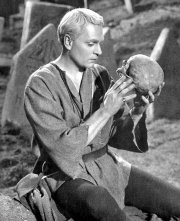 Once you get past the
minor difficulties posed by the language,
you'll probably enjoy "Hamlet" -- and not just
for its action.
Once you get past the
minor difficulties posed by the language,
you'll probably enjoy "Hamlet" -- and not just
for its action.
 Shakespeare's "Hamlet" is full of talk about death,
dead bodies, murder, suicide, disease, graves, and
so forth. And there is no traditional Christian comfort or promise
of eventual justice or happiness for the good people. But the
message is ultimately one of hope. You can be a hero.
Shakespeare's "Hamlet" is full of talk about death,
dead bodies, murder, suicide, disease, graves, and
so forth. And there is no traditional Christian comfort or promise
of eventual justice or happiness for the good people. But the
message is ultimately one of hope. You can be a hero.
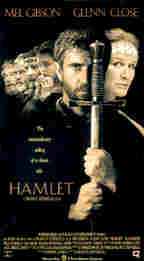 Hamlet, our hero, is the son of the previous king of Denmark,
also named Hamlet ("Old Hamlet", "Hamlet Senior" as we'd say),
who has died less than two months ago.
Hamlet remembers his father as an all-around good guy, and
as a tender husband who would even make a special effort to
shield his wife's face from the cold Danish wind.
The day Hamlet was born, Old Hamlet settled a land dispute
by killing the King of Norway in personal combat.
Hamlet, our hero, is the son of the previous king of Denmark,
also named Hamlet ("Old Hamlet", "Hamlet Senior" as we'd say),
who has died less than two months ago.
Hamlet remembers his father as an all-around good guy, and
as a tender husband who would even make a special effort to
shield his wife's face from the cold Danish wind.
The day Hamlet was born, Old Hamlet settled a land dispute
by killing the King of Norway in personal combat. Hamlet was
a college student at Wittenberg when his father died.
(Of course the historical Hamlet, who lived around 700,
could not have attended Wittenberg, founded in 1502).
The monarchy went to his father's brother, Claudius.
(Shakespeare and the other characters just call him "King".)
Hamlet's mother, Gertrude, married Claudius within less
than a month.
Hamlet was
a college student at Wittenberg when his father died.
(Of course the historical Hamlet, who lived around 700,
could not have attended Wittenberg, founded in 1502).
The monarchy went to his father's brother, Claudius.
(Shakespeare and the other characters just call him "King".)
Hamlet's mother, Gertrude, married Claudius within less
than a month. Exactly why Claudius
rather than Hamlet succeeded Old Hamlet
is not explained. Hamlet refers (V.ii) to
"the
election", i.e., the choosing of a new king by a
vote of a small number of warlords (as in Macbeth).
(By Shakespeare time, it was the Danish royal family
that voted.)
Interestingly, the Norwegian king is also succeeded by
his brother, rather than by his own infant son Fortinbras.
Exactly why Claudius
rather than Hamlet succeeded Old Hamlet
is not explained. Hamlet refers (V.ii) to
"the
election", i.e., the choosing of a new king by a
vote of a small number of warlords (as in Macbeth).
(By Shakespeare time, it was the Danish royal family
that voted.)
Interestingly, the Norwegian king is also succeeded by
his brother, rather than by his own infant son Fortinbras.
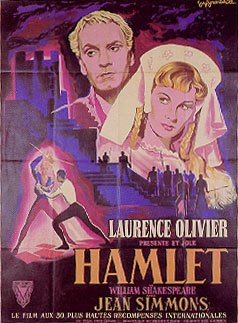 I.i.
I.i.
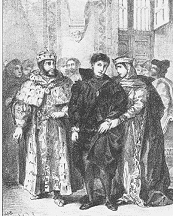 I.ii.
I.ii. Hamlet is left alone. He
talks to himself / the audience. Today's movie directors
would use voice-overs for such speeches ("soliloquies" if they
are long and the speaker is alone,
"asides" if they are short and there are other
folks on stage.) He talks about losing interest in life
and how upset he is by his mother's remarriage and its implications.
(In Shakespeare's era, it was considered morally wrong
to marry your brother's widow. Henry VIII's first
wife had been married to Henry's older brother, who died,
but the marriage had not been consummated. This puzzle sparked the
English reformation.)
Hamlet is trapped in a situation where things are obviously
very wrong. Like other people at such times, Hamlet wishes God hadn't forbidden suicide. Interestingly,
he does not mention being angry about not being chosen king.
Horatio, Marcellus, and Bernardo come in. Hamlet is surprised
to see his school buddy. Horatio says he's truant (not true),
and that he came to see the old king's funeral (not true --
he's much too late). Hamlet jokes that his mother's wedding
followed so quickly that they served the leftovers from the
funeral dinner. (I think Horatio
probably came to Elsinore out of
concern for Hamlet, spoke with the guards first, and was
invited at once to see the ghost. Some guys don't say to another guy,
"I came to see YOU" even when it's obvious.)
You'll need to decide what Hamlet means when he says that
he sees his father "in his mind's eye".
Sometimes, bereaved people notice their eyes fooling them --
shadows forming themselves in the mind into an image of the deceased.
Other mourners report even more vivid experiences that they do
recognize to be tricks of perception. Or perhaps Hamlet is simply
thinking a lot about his father, or holding onto his good memories.
The friends tell Hamlet about the ghost.
Hamlet asks what the ghost looked like -- skin color and beard
colors -- and agrees they match his father. Hamlet asks the
men to keep this a secret and to let him join them
the next night, hoping the ghost will return and talk.
Afterwards he says he suspects foul play. Everybody
else probably does, too, even without any ghost.
Hamlet is left alone. He
talks to himself / the audience. Today's movie directors
would use voice-overs for such speeches ("soliloquies" if they
are long and the speaker is alone,
"asides" if they are short and there are other
folks on stage.) He talks about losing interest in life
and how upset he is by his mother's remarriage and its implications.
(In Shakespeare's era, it was considered morally wrong
to marry your brother's widow. Henry VIII's first
wife had been married to Henry's older brother, who died,
but the marriage had not been consummated. This puzzle sparked the
English reformation.)
Hamlet is trapped in a situation where things are obviously
very wrong. Like other people at such times, Hamlet wishes God hadn't forbidden suicide. Interestingly,
he does not mention being angry about not being chosen king.
Horatio, Marcellus, and Bernardo come in. Hamlet is surprised
to see his school buddy. Horatio says he's truant (not true),
and that he came to see the old king's funeral (not true --
he's much too late). Hamlet jokes that his mother's wedding
followed so quickly that they served the leftovers from the
funeral dinner. (I think Horatio
probably came to Elsinore out of
concern for Hamlet, spoke with the guards first, and was
invited at once to see the ghost. Some guys don't say to another guy,
"I came to see YOU" even when it's obvious.)
You'll need to decide what Hamlet means when he says that
he sees his father "in his mind's eye".
Sometimes, bereaved people notice their eyes fooling them --
shadows forming themselves in the mind into an image of the deceased.
Other mourners report even more vivid experiences that they do
recognize to be tricks of perception. Or perhaps Hamlet is simply
thinking a lot about his father, or holding onto his good memories.
The friends tell Hamlet about the ghost.
Hamlet asks what the ghost looked like -- skin color and beard
colors -- and agrees they match his father. Hamlet asks the
men to keep this a secret and to let him join them
the next night, hoping the ghost will return and talk.
Afterwards he says he suspects foul play. Everybody
else probably does, too, even without any ghost.
 I.iv.
I.iv.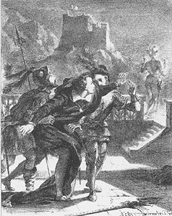 The ghost beckons Hamlet. Horatio warns him not to
follow, because the ghost
might drive him insane. Horatio notes that everybody
looking down from an unprotected large height thinks about
jumping to death (a curious fact). Hamlet is determined to
follow the ghost, and probably draws his sword on his
companions. (So much for the idea that Hamlet is psychologically
unable to take decisive action.) Hamlet says, "My fate cries
out", i.e., that he's going to his destiny. He walks off the stage
after the ghost. Directors often have Hamlet hold
the handle of his sword in front of his face to make a cross,
holy symbol for protection.
Marcellus (who like everybody else surely
suspects Claudius of foul play) says, "Something is rotten
in the state of Denmark" (usually misquoted and misattributed to
Hamlet himself.) Horatio says God will take care of Hamlet
("Heaven will direct it"). "Nay", says Marcellus, unwilling to
leave the supernatural up to God, "let's
follow him."
The ghost beckons Hamlet. Horatio warns him not to
follow, because the ghost
might drive him insane. Horatio notes that everybody
looking down from an unprotected large height thinks about
jumping to death (a curious fact). Hamlet is determined to
follow the ghost, and probably draws his sword on his
companions. (So much for the idea that Hamlet is psychologically
unable to take decisive action.) Hamlet says, "My fate cries
out", i.e., that he's going to his destiny. He walks off the stage
after the ghost. Directors often have Hamlet hold
the handle of his sword in front of his face to make a cross,
holy symbol for protection.
Marcellus (who like everybody else surely
suspects Claudius of foul play) says, "Something is rotten
in the state of Denmark" (usually misquoted and misattributed to
Hamlet himself.) Horatio says God will take care of Hamlet
("Heaven will direct it"). "Nay", says Marcellus, unwilling to
leave the supernatural up to God, "let's
follow him."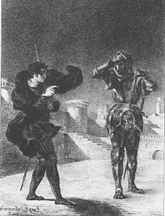 I.v.
I.v. Hamlet says he'll remember what he's heard "while memory holds a
seat [i.e., still functions] in this distracted globe." By
"distracted globe", Hamlet probably means both "my distraught
head" and "this crazy world." (The name of the theater,
too.) Hamlet already has made up his
mind about Claudius and his mother, without the ghost's help.
So before considering whether the ghost is telling the truth,
Hamlet calls his mother a "most pernicious woman", and
says of Claudius "one may smile, and smile, and be a villain."
We all know that from experience -- most really
bad people pretend to be nice and friendly.
Hamlet says he'll remember what he's heard "while memory holds a
seat [i.e., still functions] in this distracted globe." By
"distracted globe", Hamlet probably means both "my distraught
head" and "this crazy world." (The name of the theater,
too.) Hamlet already has made up his
mind about Claudius and his mother, without the ghost's help.
So before considering whether the ghost is telling the truth,
Hamlet calls his mother a "most pernicious woman", and
says of Claudius "one may smile, and smile, and be a villain."
We all know that from experience -- most really
bad people pretend to be nice and friendly. II.ii.
II.ii.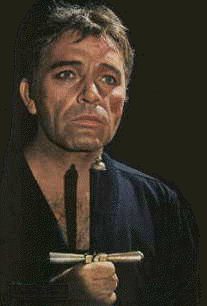 As before, Polonius can be a foolish busybody or a sinister
old man. (Foolish busybodies do not usually become
chief advisors to warrior-kings.)
Polonius launches into a verbose speech about finding the
cause of madness, prompting the queen to tell him to get
to the point ("More matter with less art"; the queen actually
cares about Hamlet.) He reads a love letter from Hamlet.
It's about the genuineness of his love. Polonius asks
the king, "What do you think of me?" The king replies, "[You are]
a man faithful and honorable." Now Polonius tells a lie. He emphasizes
that he had
no knowledge of Hamlet's romantic interest in Ophelia until she told him
and gave him the love letter. Polonius then truthfully tells how he
forbade Ophelia to see or accept messages from Hamlet.
However, Polonius does not mention the
wrist-grabbing episode. He then reminds the king of how reliable
an advisor he has always been, and says "Take this from this" (my head
off my shoulders, or my insignia of office from me; the actor will
show which is meant) "if this be otherwise." He finishes,
"If circumstances lead me [i.e., allow, the actor could say "let"], I will find /
Where truth is hid, though it were hid indeed / Within the
center [of the earth]." He suggests he and the king hide and watch
Ophelia and Hamlet. Polonius likes to spy.
As before, Polonius can be a foolish busybody or a sinister
old man. (Foolish busybodies do not usually become
chief advisors to warrior-kings.)
Polonius launches into a verbose speech about finding the
cause of madness, prompting the queen to tell him to get
to the point ("More matter with less art"; the queen actually
cares about Hamlet.) He reads a love letter from Hamlet.
It's about the genuineness of his love. Polonius asks
the king, "What do you think of me?" The king replies, "[You are]
a man faithful and honorable." Now Polonius tells a lie. He emphasizes
that he had
no knowledge of Hamlet's romantic interest in Ophelia until she told him
and gave him the love letter. Polonius then truthfully tells how he
forbade Ophelia to see or accept messages from Hamlet.
However, Polonius does not mention the
wrist-grabbing episode. He then reminds the king of how reliable
an advisor he has always been, and says "Take this from this" (my head
off my shoulders, or my insignia of office from me; the actor will
show which is meant) "if this be otherwise." He finishes,
"If circumstances lead me [i.e., allow, the actor could say "let"], I will find /
Where truth is hid, though it were hid indeed / Within the
center [of the earth]." He suggests he and the king hide and watch
Ophelia and Hamlet. Polonius likes to spy.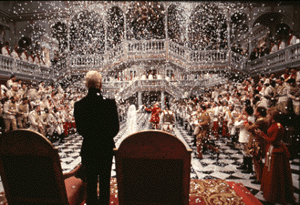 Hamlet
levels with his friends. There was a time when the
beauty of the earth, the sky, and the thoughts and accomplishments of
the human race filled him with happiness. (All of this is
good Renaissance thought, and familiar from many times and places -- and
I hope you've felt this as well.)
Now he has lost
his ability to derive enjoyment,
though he knows the earth, sky, and people should still
seem wonderful.
They seem instead to be "the quintessence of dust".
Anyone who's experienced depression knows the feeling.
"Quintessence" ("fifth essence"; compare Bruce Willis's
"Fifth Element") was an idea from prescientific
thought -- a mystical substance that made fire, air, water, and earth
work together, and supposedly what the planets and stars were made of.
Hamlet
levels with his friends. There was a time when the
beauty of the earth, the sky, and the thoughts and accomplishments of
the human race filled him with happiness. (All of this is
good Renaissance thought, and familiar from many times and places -- and
I hope you've felt this as well.)
Now he has lost
his ability to derive enjoyment,
though he knows the earth, sky, and people should still
seem wonderful.
They seem instead to be "the quintessence of dust".
Anyone who's experienced depression knows the feeling.
"Quintessence" ("fifth essence"; compare Bruce Willis's
"Fifth Element") was an idea from prescientific
thought -- a mystical substance that made fire, air, water, and earth
work together, and supposedly what the planets and stars were made of.
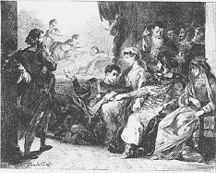 The
players arrive, heralded by Polonius, who Hamlet
calls a big baby. Hamlet fakes madness for Polonius's benefit.
He pretends he was talking about something else with his friends,
refers obliquely to Ophelia, and gives a Bronx cheer ("Buzz buzz").
When the players arrive, Hamlet drops the pretense of madness,
and greets old friends. One actor repeats a bombastic speech
on the fall of Troy, overacting with tears in his eyes.
The
players arrive, heralded by Polonius, who Hamlet
calls a big baby. Hamlet fakes madness for Polonius's benefit.
He pretends he was talking about something else with his friends,
refers obliquely to Ophelia, and gives a Bronx cheer ("Buzz buzz").
When the players arrive, Hamlet drops the pretense of madness,
and greets old friends. One actor repeats a bombastic speech
on the fall of Troy, overacting with tears in his eyes. Hamlet soliloquizes. He calls himself a "rogue" and a
"peasant slave". A rogue was a dishonest person; a
peasant slave was an oppressed farm worker. He talks about
how the actor got himself all worked-up over something about
which he really cared nothing (the fall of Troy). Hamlet
contrasts this with his own passiveness in both word and deed.
What does Hamlet
really mean? He reminds us, at the end of the soliloquy, that even
though he thinks the ghost is telling the truth, he needs to be sure
this is not a demonic deception.
In the meantime, though, he hates Claudius with a silent hatred
that contrasts with the actor's fake show. Hamlet calls himself
"gutless" ("I am lily-livered and lack gall").
Hamlet soliloquizes. He calls himself a "rogue" and a
"peasant slave". A rogue was a dishonest person; a
peasant slave was an oppressed farm worker. He talks about
how the actor got himself all worked-up over something about
which he really cared nothing (the fall of Troy). Hamlet
contrasts this with his own passiveness in both word and deed.
What does Hamlet
really mean? He reminds us, at the end of the soliloquy, that even
though he thinks the ghost is telling the truth, he needs to be sure
this is not a demonic deception.
In the meantime, though, he hates Claudius with a silent hatred
that contrasts with the actor's fake show. Hamlet calls himself
"gutless" ("I am lily-livered and lack gall").  Hamlet's
famous speech on whether it's worthwhile
living or doing anything needs little comment.
He says it seems to him that life is not worth living,
mostly because people treat each other so stupidly
and badly. We also suffer from disease and old age --
even living too long is a "calamity".
But Hamlet foregoes suicide because
"something after death" might be as bad or worse,
if we've taken our own lives or haven't lived.
He's saying what many people have felt, especially
those who do not assume that the Christian account
of the afterlife is true -- or even that there is any afterlife.
Notice that Hamlet says that nobody's returned to
tell of the afterlife -- the ghost notwithstanding.
Shakespeare seems to be saying, loud and clear, "Don't
focus on the story. Focus on the ideas."
Some people have been puzzled by the lines "Thus conscience
does make cowards of us all; / And thus the native hue of
resolution / Is sicklied o'er with the pale cast of thought, /
And enterprises of great pitch and moment / With this
regard their currents turn awry / And lose the name of action."
Not only is Hamlet talking about actual suicide -- he's also
talking about "lifelong suicide" by doing nothing,
choosing the easy passive approach to life.
Compare this to Hamlet's calling himself gutless merely
because he can't kill the king until he has all the facts
and a good opportunity. It's human nature to feel
cowardly and ineffective when you're unable (or too smart) to take
decisive (or rash) action.
Hamlet's
famous speech on whether it's worthwhile
living or doing anything needs little comment.
He says it seems to him that life is not worth living,
mostly because people treat each other so stupidly
and badly. We also suffer from disease and old age --
even living too long is a "calamity".
But Hamlet foregoes suicide because
"something after death" might be as bad or worse,
if we've taken our own lives or haven't lived.
He's saying what many people have felt, especially
those who do not assume that the Christian account
of the afterlife is true -- or even that there is any afterlife.
Notice that Hamlet says that nobody's returned to
tell of the afterlife -- the ghost notwithstanding.
Shakespeare seems to be saying, loud and clear, "Don't
focus on the story. Focus on the ideas."
Some people have been puzzled by the lines "Thus conscience
does make cowards of us all; / And thus the native hue of
resolution / Is sicklied o'er with the pale cast of thought, /
And enterprises of great pitch and moment / With this
regard their currents turn awry / And lose the name of action."
Not only is Hamlet talking about actual suicide -- he's also
talking about "lifelong suicide" by doing nothing,
choosing the easy passive approach to life.
Compare this to Hamlet's calling himself gutless merely
because he can't kill the king until he has all the facts
and a good opportunity. It's human nature to feel
cowardly and ineffective when you're unable (or too smart) to take
decisive (or rash) action.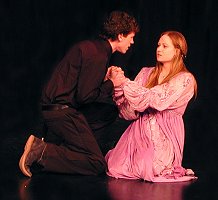 Hamlet sees Ophelia, reading a book. He assumes it's her
prayer book (she is evidently not much of a pleasure reader), and asks
her to pray for the forgiveness of his sins. Instead, she
tries to give him back his love letters, saying he has
"prove[d] unkind", which is ridiculous. Hamlet immediately
realizes that she has been put up to this. He responds like
a thoughtful man of strong feelings.
He generalizes his disappointment with the two women in his life
to all women -- I think unfairly. (Watch how his attitude toward women matures later in the play.)
But the Olivier movie's torrent of loud verbal abuse seems wrong.
Showing Hamlet's emotional turmoil and conflict seems better.
Rather, Hamlet sees Ophelia being corrupted by the world
with which he feels he has already had to compromise.
He doesn't want this to happen to the girl about whom
he cares so much. Like most men
during breaking up, he says "I loved you" and "I didn't love you".
More meaningfully, Hamlet talks about fakeness. He asks
where her father is, and must know that she is lying.
(In Ethan Hawke's version, he finds a wire microphone hidden
on Ophelia.)
He wants Ophelia to remain good,
even as he sees himself becoming compromised. She would have
an opportunity to renounce the world by joining a convent, and
he urges her to do so.
(Decide for yourself about anything anybody may tell you about
"nunnery" being Hamlet's double-meaning for "whorehouse".
I can't make sense out of this in the present context.)
In our world, even being beautiful drives people to be dishonest.
Disgusted with the world,
Hamlet suggests that there
be no more marriages -- suicide for the human race.
Hamlet sees Ophelia, reading a book. He assumes it's her
prayer book (she is evidently not much of a pleasure reader), and asks
her to pray for the forgiveness of his sins. Instead, she
tries to give him back his love letters, saying he has
"prove[d] unkind", which is ridiculous. Hamlet immediately
realizes that she has been put up to this. He responds like
a thoughtful man of strong feelings.
He generalizes his disappointment with the two women in his life
to all women -- I think unfairly. (Watch how his attitude toward women matures later in the play.)
But the Olivier movie's torrent of loud verbal abuse seems wrong.
Showing Hamlet's emotional turmoil and conflict seems better.
Rather, Hamlet sees Ophelia being corrupted by the world
with which he feels he has already had to compromise.
He doesn't want this to happen to the girl about whom
he cares so much. Like most men
during breaking up, he says "I loved you" and "I didn't love you".
More meaningfully, Hamlet talks about fakeness. He asks
where her father is, and must know that she is lying.
(In Ethan Hawke's version, he finds a wire microphone hidden
on Ophelia.)
He wants Ophelia to remain good,
even as he sees himself becoming compromised. She would have
an opportunity to renounce the world by joining a convent, and
he urges her to do so.
(Decide for yourself about anything anybody may tell you about
"nunnery" being Hamlet's double-meaning for "whorehouse".
I can't make sense out of this in the present context.)
In our world, even being beautiful drives people to be dishonest.
Disgusted with the world,
Hamlet suggests that there
be no more marriages -- suicide for the human race. Ophelia thinks Hamlet, who she admired so much, is crazy.
(Once again, being genuine looks like insanity.)
But the king comes out and says that he thinks that Hamlet
is neither in love, nor insane, but very upset about something.
Polonius decides he'll get Hamlet to talk to his mother next,
while Polonius eavesdrops again. Polonius likes to spy.
The king decides that he will send Hamlet to England
"for the demand of our neglected tribute" (i.e., to ask
for protection money.)
Ophelia thinks Hamlet, who she admired so much, is crazy.
(Once again, being genuine looks like insanity.)
But the king comes out and says that he thinks that Hamlet
is neither in love, nor insane, but very upset about something.
Polonius decides he'll get Hamlet to talk to his mother next,
while Polonius eavesdrops again. Polonius likes to spy.
The king decides that he will send Hamlet to England
"for the demand of our neglected tribute" (i.e., to ask
for protection money.) Hamlet tells Horatio to watch the king as the players
re-enact the murder of Old Hamlet. Hamlet jokes -- first
bawdily, then about how his mother looks cheerful
despite his father having died only two
hours ago. (Ophelia, who is literal-minded and
thinks he is crazy, corrects him.)
Hamlet tells Horatio to watch the king as the players
re-enact the murder of Old Hamlet. Hamlet jokes -- first
bawdily, then about how his mother looks cheerful
despite his father having died only two
hours ago. (Ophelia, who is literal-minded and
thinks he is crazy, corrects him.)
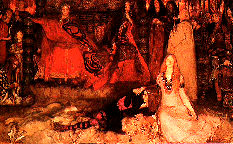 The
play begins with a "dumb show", in which the story is
pantomimed. The king and the queen profess
love, the king falls asleep, and the villain pours poison in the
king's ear and seduces the queen. If Polonius is a sinister old
man and Claudius's accomplice,
he can glance at the king when the poison is poured in the ear.
If Gertrude knows the details of the homicide (the director can decide),
she can glance at the king when the poison is poured in the ear,
or be outraged herself.
Many directors will choose to omit everything after the poison
is poured in the dumb show,
and have the King get upset and run out right now.
Otherwise, the play proceeds, while Hamlet cracks dirty jokes
and the king mentions that the story is "offensive".
Courtiers who are suspicious or in-the-know can shoot
glances at the king during the production. When the villain
pours the poison in the victim's ear, and Hamlet shouts
"You will see [next] how the murderer gets the love of
[the murdered man]'s wife", the king stands up, shouts
"Give me some light! Away!", Polonius calls for torches
("Somebody get the lights..."), and everybody runs out.
The
play begins with a "dumb show", in which the story is
pantomimed. The king and the queen profess
love, the king falls asleep, and the villain pours poison in the
king's ear and seduces the queen. If Polonius is a sinister old
man and Claudius's accomplice,
he can glance at the king when the poison is poured in the ear.
If Gertrude knows the details of the homicide (the director can decide),
she can glance at the king when the poison is poured in the ear,
or be outraged herself.
Many directors will choose to omit everything after the poison
is poured in the dumb show,
and have the King get upset and run out right now.
Otherwise, the play proceeds, while Hamlet cracks dirty jokes
and the king mentions that the story is "offensive".
Courtiers who are suspicious or in-the-know can shoot
glances at the king during the production. When the villain
pours the poison in the victim's ear, and Hamlet shouts
"You will see [next] how the murderer gets the love of
[the murdered man]'s wife", the king stands up, shouts
"Give me some light! Away!", Polonius calls for torches
("Somebody get the lights..."), and everybody runs out.
 Now Claudius is by himself. The play has really affected him.
He tries to pray. We
get to listen. If this were
a contemporary
action movie (today's "revenge plays"),
we would simply hate the bad guy and wait
for him to get his just deserts in the end. Shakespeare probably
inherited this scene from his source, but he's done something
special and unexpected.
By giving Claudius
real substance and depth, Shakespeare has at once imitated
life, increased Hamlet's own stature by giving him
an enemy with real character,
and reinforced the theme of appearance against reality.
Hamlet wants to take decisive action, but can't.
It turns
out that Claudius cannot, either. And it's Claudius --
not Hamlet -- who is prevented from acting by his
own inner turmoil. He hates his crime.
He wants to repent. He realizes he could come clean,
confess all, and part with his crown... and his queen.
He realizes that until he is willing to do this,
he cannot find forgiveness from God.
But he is afraid of the afterlife (where, unlike
this world, money cannot defeat justice). And he is
disgusted by the murder itself. Claudius is trying hard,
and calls on God's angels to help him get up the courage
simply to pray for God's grace.
Now Claudius is by himself. The play has really affected him.
He tries to pray. We
get to listen. If this were
a contemporary
action movie (today's "revenge plays"),
we would simply hate the bad guy and wait
for him to get his just deserts in the end. Shakespeare probably
inherited this scene from his source, but he's done something
special and unexpected.
By giving Claudius
real substance and depth, Shakespeare has at once imitated
life, increased Hamlet's own stature by giving him
an enemy with real character,
and reinforced the theme of appearance against reality.
Hamlet wants to take decisive action, but can't.
It turns
out that Claudius cannot, either. And it's Claudius --
not Hamlet -- who is prevented from acting by his
own inner turmoil. He hates his crime.
He wants to repent. He realizes he could come clean,
confess all, and part with his crown... and his queen.
He realizes that until he is willing to do this,
he cannot find forgiveness from God.
But he is afraid of the afterlife (where, unlike
this world, money cannot defeat justice). And he is
disgusted by the murder itself. Claudius is trying hard,
and calls on God's angels to help him get up the courage
simply to pray for God's grace.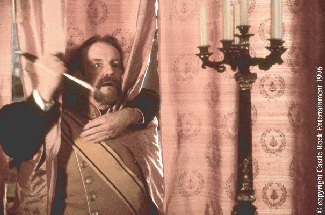 III.iv.
III.iv.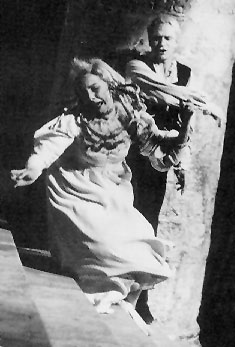 The ghost enters,
visible to Hamlet but not to the queen. Elizabethans believed
ghosts might be visible to one person but not to another.
Perhaps the queen is too morally debased to see the
ghost, or perhaps Shakespeare didn't want to clutter
his story by having the ghost and the queen
have it out between themselves. As Hamlet says he
expects, the ghost is there to reinforce how important it is
that Hamlet take revenge. But the ghost also asks Hamlet to
"step between [the queen] and her fighting soul", and help her
in this moment of crisis to make the right choice. The queen
thinks Hamlet is crazy. The ghost leaves.
The ghost enters,
visible to Hamlet but not to the queen. Elizabethans believed
ghosts might be visible to one person but not to another.
Perhaps the queen is too morally debased to see the
ghost, or perhaps Shakespeare didn't want to clutter
his story by having the ghost and the queen
have it out between themselves. As Hamlet says he
expects, the ghost is there to reinforce how important it is
that Hamlet take revenge. But the ghost also asks Hamlet to
"step between [the queen] and her fighting soul", and help her
in this moment of crisis to make the right choice. The queen
thinks Hamlet is crazy. The ghost leaves.  Hamlet tells
the queen not to dismiss what he has said about her as the
result of madness, and says how ironic it is that
virtue (his blunt talk to his mother) has to ask pardon for
its bad manners. Hamlet tells his mother to confess herself
to heaven and to repent, and not to have sex with the king.
"Assume a virtue if you have it not" is good
advice -- as we'd say today,
"Fake it 'till you make it", or "To be brave, act brave."
Carrying out Polonius's body (as in the sources), Hamlet
remarks that he's become "heaven's scourge and minister"
against a corrupt world. He also says it has "pleased heaven (God)"
-- in his killing of the old man --
to punish Polonius for his mean-minded, foolish spying, and to punish Hamlet,
who will have to take the consequences of his nasty-and-stupid act.
He tells the queen not to reveal
that he's feigning madness. He also indicates that he already
knows the spies are going to do him mischief on the
English trip, and that
he has a counter-plan that will destroy them.
Exiting, he remarks that for once, Polonius doesn't have anything
to say. We never do figure out why Gertrude cannot see
the ghost (if there is a reason). Nor does the scene
focus on her realizing that the king is a murderer.
Probably Hamlet couldn't persuade her since he still doesn't have the
evidence; she'll only realize this at the climax when she drinks
the poison.
Hamlet talks to her, as he does to others
(Ophelia, the spies, Horatio) about not being sullied
by a crooked, corrupt world.
Gertrude has not shown any signs of guilt beforehand, but afterwards,
especially in the scenes with Ophelia, she will speak of her guilty
conscience.
Hamlet tells
the queen not to dismiss what he has said about her as the
result of madness, and says how ironic it is that
virtue (his blunt talk to his mother) has to ask pardon for
its bad manners. Hamlet tells his mother to confess herself
to heaven and to repent, and not to have sex with the king.
"Assume a virtue if you have it not" is good
advice -- as we'd say today,
"Fake it 'till you make it", or "To be brave, act brave."
Carrying out Polonius's body (as in the sources), Hamlet
remarks that he's become "heaven's scourge and minister"
against a corrupt world. He also says it has "pleased heaven (God)"
-- in his killing of the old man --
to punish Polonius for his mean-minded, foolish spying, and to punish Hamlet,
who will have to take the consequences of his nasty-and-stupid act.
He tells the queen not to reveal
that he's feigning madness. He also indicates that he already
knows the spies are going to do him mischief on the
English trip, and that
he has a counter-plan that will destroy them.
Exiting, he remarks that for once, Polonius doesn't have anything
to say. We never do figure out why Gertrude cannot see
the ghost (if there is a reason). Nor does the scene
focus on her realizing that the king is a murderer.
Probably Hamlet couldn't persuade her since he still doesn't have the
evidence; she'll only realize this at the climax when she drinks
the poison.
Hamlet talks to her, as he does to others
(Ophelia, the spies, Horatio) about not being sullied
by a crooked, corrupt world.
Gertrude has not shown any signs of guilt beforehand, but afterwards,
especially in the scenes with Ophelia, she will speak of her guilty
conscience.
 The king and "two or three" of his courtiers enter. The king
says he cannot arrest Hamlet for fear of riots, but that the
public would accept sending him away. The two spies bring Hamlet in.
He talks crazy, commenting that everybody ends up dead in the end --
fat kings and lean beggars end up both food for worms, simply different
menu items. The king tells Hamlet he just go to England, and gives
sealed letters to the two spies. He tells them, "Everything is sealed
and done". It sounds as if the spies know the contents
of the letters; a director who wishes to make this clear can have
the king show the letters to the spies first.
The spies leave with Hamlet. The king, alone, tells the
audience that the letters instruct the King of England to kill Hamlet
upon his arrival.
The king and "two or three" of his courtiers enter. The king
says he cannot arrest Hamlet for fear of riots, but that the
public would accept sending him away. The two spies bring Hamlet in.
He talks crazy, commenting that everybody ends up dead in the end --
fat kings and lean beggars end up both food for worms, simply different
menu items. The king tells Hamlet he just go to England, and gives
sealed letters to the two spies. He tells them, "Everything is sealed
and done". It sounds as if the spies know the contents
of the letters; a director who wishes to make this clear can have
the king show the letters to the spies first.
The spies leave with Hamlet. The king, alone, tells the
audience that the letters instruct the King of England to kill Hamlet
upon his arrival.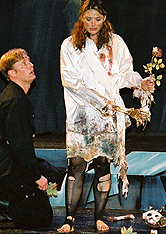 Just then, Laertes (at the head of a mob) breaks down the castle door.
The mob wants Claudius deposed and Laertes crowned king.
Laertes runs in, armed, and faces off with Claudius.
He is doing exactly what Hamlet considered doing, and didn't do.
Gertrude risks her own life by wrestling Laertes down.
Claudius tells her to let him go, because God protects kings
(uh huh). Laertes yells, and Claudius asks for a chance to explain.
Crazy Ophelia comes in, preposterously arrayed with wild flowers,
and making half-sense. Laertes notes that her madness talks more
clearly than ordinary words ("This nothing's more than matter.")
She sings another song about a dead man, and passes out symbolic flowers.
You can have fun trying to figure out who gets the rosemary
(remembrance, "thinking of you" -- weddings and funerals),
who gets the pansies ("thoughts", a pun on pensées),
who gets the fennel (flattery / infidelity) and columbines (unchastity),
who (with Ophelia) gets the rue (repentance / sorrow; probably Gertrude
gets it, as she must "wear her rue with a difference" as to
distinguish two coats of arms, since they have different reasons
to be sorry), and who gets the daisies (unrequited love; you know the game with the
daisy, "She loves me, she loves me not"). Ophelia
regrets there have been no violets (faithfulness and friendship)
available since her father died. Later, Laertes will ask violets to grow
from Ophelia's body.
Just then, Laertes (at the head of a mob) breaks down the castle door.
The mob wants Claudius deposed and Laertes crowned king.
Laertes runs in, armed, and faces off with Claudius.
He is doing exactly what Hamlet considered doing, and didn't do.
Gertrude risks her own life by wrestling Laertes down.
Claudius tells her to let him go, because God protects kings
(uh huh). Laertes yells, and Claudius asks for a chance to explain.
Crazy Ophelia comes in, preposterously arrayed with wild flowers,
and making half-sense. Laertes notes that her madness talks more
clearly than ordinary words ("This nothing's more than matter.")
She sings another song about a dead man, and passes out symbolic flowers.
You can have fun trying to figure out who gets the rosemary
(remembrance, "thinking of you" -- weddings and funerals),
who gets the pansies ("thoughts", a pun on pensées),
who gets the fennel (flattery / infidelity) and columbines (unchastity),
who (with Ophelia) gets the rue (repentance / sorrow; probably Gertrude
gets it, as she must "wear her rue with a difference" as to
distinguish two coats of arms, since they have different reasons
to be sorry), and who gets the daisies (unrequited love; you know the game with the
daisy, "She loves me, she loves me not"). Ophelia
regrets there have been no violets (faithfulness and friendship)
available since her father died. Later, Laertes will ask violets to grow
from Ophelia's body.
 The king explains to Laertes that he couldn't arrest
or prosecute Hamlet because the queen loves him
and he's popular with the common
people. He's about to tell Laertes that his
revenge is imminent ("Don't lose any sleep over that" -- l. 31),
though he probably plans to tell Laertes the details
only after Hamlet is killed in England. Just then a
letter comes from Hamlet announcing he's back in Denmark.
The king already has "Plan B". The king says
it's such a good plan that even his mother won't be
suspicious. (Uh huh. The plot that Shakespeare
inherited has some credibility problems, and Shakespeare does
not seem to care.) He will have
Laertes have a fencing match with Hamlet.
Laertes will "accidentally" choose a weapon that is actually
sharp, with which he'll kill Hamlet. (Hamlet is "most generous,
And free from all contriving", so he won't check the swords.)
Laertes mentions that he has some blade poison.
He must have bought it to use on Claudius (who he thinks
is the murderer of Polonius). Even a scratch
will kill. (Uh huh, nobody will be suspicious?)
Now the king decides that for backup (in case Laertes is
unable to stab Hamlet and make it look like an accident), he will
have a poisoned drink ready, and Hamlet will want some when he's
thirsty. (Uh huh, nobody will be suspicious?)
The king explains to Laertes that he couldn't arrest
or prosecute Hamlet because the queen loves him
and he's popular with the common
people. He's about to tell Laertes that his
revenge is imminent ("Don't lose any sleep over that" -- l. 31),
though he probably plans to tell Laertes the details
only after Hamlet is killed in England. Just then a
letter comes from Hamlet announcing he's back in Denmark.
The king already has "Plan B". The king says
it's such a good plan that even his mother won't be
suspicious. (Uh huh. The plot that Shakespeare
inherited has some credibility problems, and Shakespeare does
not seem to care.) He will have
Laertes have a fencing match with Hamlet.
Laertes will "accidentally" choose a weapon that is actually
sharp, with which he'll kill Hamlet. (Hamlet is "most generous,
And free from all contriving", so he won't check the swords.)
Laertes mentions that he has some blade poison.
He must have bought it to use on Claudius (who he thinks
is the murderer of Polonius). Even a scratch
will kill. (Uh huh, nobody will be suspicious?)
Now the king decides that for backup (in case Laertes is
unable to stab Hamlet and make it look like an accident), he will
have a poisoned drink ready, and Hamlet will want some when he's
thirsty. (Uh huh, nobody will be suspicious?) 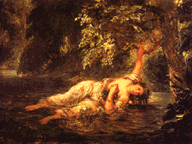 The
queen comes in, crying. Ophelia was
hanging chains of flowers on trees. She climbed a willow that
hung out over a river. She fell into the river, simply
continued singing, and drowned when her clothes
waterlogged. Please note that
this is obviously an accident, not a suicide -- just as when
a crazy person walks in front of a bus nowadays.
I think Claudius gives it out as a suicide just to inflame Laertes.
We don't know who saw Ophelia drown, or why nobody tried
to save her. Perhaps an observer from the castle battlements,
or perhaps her last acts were reconstructed from the scene,
or perhaps we are asking the wrong question.
The
queen comes in, crying. Ophelia was
hanging chains of flowers on trees. She climbed a willow that
hung out over a river. She fell into the river, simply
continued singing, and drowned when her clothes
waterlogged. Please note that
this is obviously an accident, not a suicide -- just as when
a crazy person walks in front of a bus nowadays.
I think Claudius gives it out as a suicide just to inflame Laertes.
We don't know who saw Ophelia drown, or why nobody tried
to save her. Perhaps an observer from the castle battlements,
or perhaps her last acts were reconstructed from the scene,
or perhaps we are asking the wrong question.
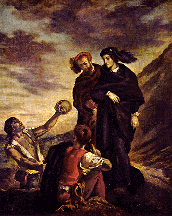 Hamlet and Horatio walk in. The gravedigger sings a contemporary song
about having been in love and making love, and thinking it
was great, but now being dead and in a grave as if he'd never lived
at all. The marks "-a-" signify his grunting as he
shovels.
He tosses up a skull. Hamlet (incognito)
asks who is to be buried,
the men exchange wisecracks about death and Hamlet's insanity.
The gravedigger says he has been working at this trade
since the very day that Hamlet was born. (Thus the gravedigger
comes to stand for Hamlet's own mortality.)
Hamlet asks about dead bodies, makes a four-way pun on the
word "fine", and jokes about "chop-fallen" (in the living
it means frowning, but the skull has lost its "chop", i.e.,
jawbone.) Loggits is the game we call horseshoes.
"Let her paint an inch thick" is a reference to the new fashion of
women wearing make-up. Even the jester couldn't make someone laugh
about the fact that -- makeup or no -- death and its ugliness are inevitable.
The gravedigger tells
him which skull belonged to the court jester, Yorick.
Hamlet also
remembers Yorick's jokes and his kindness. But there is more.
Hamlet and Horatio walk in. The gravedigger sings a contemporary song
about having been in love and making love, and thinking it
was great, but now being dead and in a grave as if he'd never lived
at all. The marks "-a-" signify his grunting as he
shovels.
He tosses up a skull. Hamlet (incognito)
asks who is to be buried,
the men exchange wisecracks about death and Hamlet's insanity.
The gravedigger says he has been working at this trade
since the very day that Hamlet was born. (Thus the gravedigger
comes to stand for Hamlet's own mortality.)
Hamlet asks about dead bodies, makes a four-way pun on the
word "fine", and jokes about "chop-fallen" (in the living
it means frowning, but the skull has lost its "chop", i.e.,
jawbone.) Loggits is the game we call horseshoes.
"Let her paint an inch thick" is a reference to the new fashion of
women wearing make-up. Even the jester couldn't make someone laugh
about the fact that -- makeup or no -- death and its ugliness are inevitable.
The gravedigger tells
him which skull belonged to the court jester, Yorick.
Hamlet also
remembers Yorick's jokes and his kindness. But there is more.
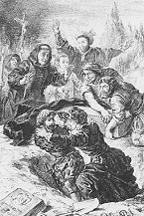 The
funeral party comes in, and Hamlet recognizes "maimed rites",
i.e., much of the era's
normal Christian burial service is eliminated because
of the suspicion of suicide.
Hamlet and Horatio hide. Laertes protests the
fact that the service is limited. The pastor's reply is
organized religion at its worst.
Laertes says the
priest is the one who will go to hell. He jumps into the grave,
picks up the corpse and embraces it, and launches into a bombastic
speech. Hamlet comes out and jumps into the grave too. He calls
himself "Hamlet the Dane", claiming the royal title.
(In Shakespeare's era, a monarch was called by the name of his country
for short.) Shakespeare's heroes all develop as people, and
many people (myself included) dislike Hamlet's attitude
toward women as evidenced in the first half of the play. But
in striking
contrast to the "nunnery" scene, he now proclaims boldly,
"I loved Ophelia." Laertes
drops the corpse and starts choking Hamlet. Separated,
Hamlet parodies Laertes's bombastic speech. Horatio takes
Hamlet off and the king says to Laertes, "Good. Now we have
an excuse for a duel right away."
The
funeral party comes in, and Hamlet recognizes "maimed rites",
i.e., much of the era's
normal Christian burial service is eliminated because
of the suspicion of suicide.
Hamlet and Horatio hide. Laertes protests the
fact that the service is limited. The pastor's reply is
organized religion at its worst.
Laertes says the
priest is the one who will go to hell. He jumps into the grave,
picks up the corpse and embraces it, and launches into a bombastic
speech. Hamlet comes out and jumps into the grave too. He calls
himself "Hamlet the Dane", claiming the royal title.
(In Shakespeare's era, a monarch was called by the name of his country
for short.) Shakespeare's heroes all develop as people, and
many people (myself included) dislike Hamlet's attitude
toward women as evidenced in the first half of the play. But
in striking
contrast to the "nunnery" scene, he now proclaims boldly,
"I loved Ophelia." Laertes
drops the corpse and starts choking Hamlet. Separated,
Hamlet parodies Laertes's bombastic speech. Horatio takes
Hamlet off and the king says to Laertes, "Good. Now we have
an excuse for a duel right away."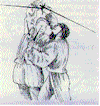 Horatio remarks that it'll only be a short time before
the king finds out about the execution of the spies.
Hamlet says life itself is short ("The interim is mine, / And
a man's life's no more than to say 'One'.")
Horatio remarks that it'll only be a short time before
the king finds out about the execution of the spies.
Hamlet says life itself is short ("The interim is mine, / And
a man's life's no more than to say 'One'.")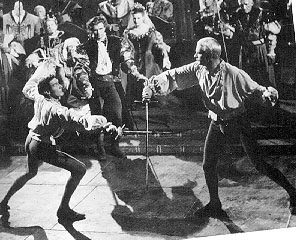 The duel is set up. In Q1 and Q2, they bring foils (long
slender swords)
and daggers;
in Q2 and F foils and gauntlets (metal gloves).
Hamlet puns on "foil", a metal backing that made gemstones
shine brighter; he will make Laertes look even more the
champion fencer. (Thanks to Hamlet, "foil" has come to mean any
character who contrasts with the hero, showing up what
kind of person the hero is.)
Hamlet apologizes to Laertes, and blames his distracted
mental state -- he wasn't himself. (There is a parallel in
Romans 7-8).
The duel is set up. In Q1 and Q2, they bring foils (long
slender swords)
and daggers;
in Q2 and F foils and gauntlets (metal gloves).
Hamlet puns on "foil", a metal backing that made gemstones
shine brighter; he will make Laertes look even more the
champion fencer. (Thanks to Hamlet, "foil" has come to mean any
character who contrasts with the hero, showing up what
kind of person the hero is.)
Hamlet apologizes to Laertes, and blames his distracted
mental state -- he wasn't himself. (There is a parallel in
Romans 7-8).
 Laertes says in an aside that he's having moral
qualms about killing Hamlet by treachery.
The third round ends in a draw (perhaps locked weapons),
then Laertes reaches out and scratches Hamlet illegally
when he is not looking. (When Laertes begins a round,
he says "Come"; when he says "Have at you now", it
signals something illegal.)
They scuffle (because of the illegal blow,
Hamlet is "incensed"). During the scuffle,
they exchange swords. This was a recognized move in
fencing. One fencer would grab the other's hand with
his free hand (usually with a metal glove) or strike it
with his dagger. The right response was for the other
fencer to do the same, and swords could then be exchanged.
On stage, the exchange
is usually done by having Hamlet disarm Laertes with
his sword, which flies up. Hamlet puts his foot on
the sharp poisoned sword (he knows it's sharp, but
not that it's poisoned, and he intended to scratch
Laertes back). Hamlet gives his own sword to Laertes,
fights again, and inflicts a deeper wound on him, explaining
why Laertes dies quicker.
Laertes says in an aside that he's having moral
qualms about killing Hamlet by treachery.
The third round ends in a draw (perhaps locked weapons),
then Laertes reaches out and scratches Hamlet illegally
when he is not looking. (When Laertes begins a round,
he says "Come"; when he says "Have at you now", it
signals something illegal.)
They scuffle (because of the illegal blow,
Hamlet is "incensed"). During the scuffle,
they exchange swords. This was a recognized move in
fencing. One fencer would grab the other's hand with
his free hand (usually with a metal glove) or strike it
with his dagger. The right response was for the other
fencer to do the same, and swords could then be exchanged.
On stage, the exchange
is usually done by having Hamlet disarm Laertes with
his sword, which flies up. Hamlet puts his foot on
the sharp poisoned sword (he knows it's sharp, but
not that it's poisoned, and he intended to scratch
Laertes back). Hamlet gives his own sword to Laertes,
fights again, and inflicts a deeper wound on him, explaining
why Laertes dies quicker.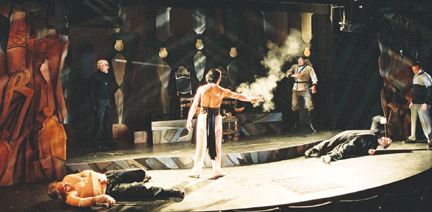 The queen announces the drink is poisoned, and drops
dead. Laertes tells everything, and shouts "The king's to blame!"
For the first time, Hamlet can kill the king
and have people realize he was right.
Hamlet stabs the king with the poisoned blade,
then forces the poisoned beverage down his throat. Elizabethans
pretended to believe that kings were sacred, so
Shakespeare had to have everybody shout "Treason",
but nobody does anything. (If the director wishes,
the guards and court can
draw their own weapons and surround the king. Horatio
can show the letters to England at this time, too.) Hamlet
says he is dying, and Horatio offers to commit suicide
like a Roman soldier when his side was defeated.
Hamlet drinks the poison instead, to ensure Horatio won't.
If Hamlet saw no reason to live, then Horatio has one --
to tell the truth about Hamlet.
The queen announces the drink is poisoned, and drops
dead. Laertes tells everything, and shouts "The king's to blame!"
For the first time, Hamlet can kill the king
and have people realize he was right.
Hamlet stabs the king with the poisoned blade,
then forces the poisoned beverage down his throat. Elizabethans
pretended to believe that kings were sacred, so
Shakespeare had to have everybody shout "Treason",
but nobody does anything. (If the director wishes,
the guards and court can
draw their own weapons and surround the king. Horatio
can show the letters to England at this time, too.) Hamlet
says he is dying, and Horatio offers to commit suicide
like a Roman soldier when his side was defeated.
Hamlet drinks the poison instead, to ensure Horatio won't.
If Hamlet saw no reason to live, then Horatio has one --
to tell the truth about Hamlet.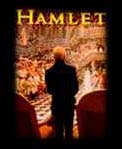
Shakespeare's "Hamlet" was a remake of an already popular
play, based in turn on historical fiction, based
in turn on an episode from the Dark Ages, the lawless,
might-makes-right era that followed the collapse
of Roman-era civilization.
There is a Frisian runic inscription from about 700 AD to the effect that
"On a cliff Amleth put up resistance" (translated from Danish: "På en
klint satte Amled sig til værge"). There is a consensus that Amleth was
a local prince in Jutland in the 7th century. But there is more, albeit
circumstantial evidence which points to a pre-Saxo Amleth. A report
from a vicar north of Aarhus in Jutland from 1623 describes a locality
called Ammelhede where according to local legend Amled lies buried. The
details of this report shows how Amled existed in popular memory,
independent of Saxo which at that time had only existed in Danish a
hundred years and had practically no readership beyond the clergy and a
few academics. Ammelhede exists to this very day, and in 1933 the
local tourist board put up a stone with this memorial inscription:
"Amled ypperste /
Oldtids-snille /
teed sig tåbe /
Til HĎvnens time / Kaaret paa
ting / Af jyder til konge/
H jsat han hviler / Paa Ammel Hede" ( = "Amled
the greatest / Craftiest of Old /
Acted a fool / Until the hour of
revenge /
Elected at the "Ting" /
by Jutes to be king / raised high he rests /
at Ammel Heath" [my translation]) So next time you visit Denmark, stop
by Ammelhede, a few miles to the south-east of Randers -- don't even
think about visiting the bogus 'Hamlet's Grave' between Elsinore and
Copenhagen!
Royal
Deceit is a B-movie, not released in theaters,
adapted from Saxo. I'd appreciate knowing of any good links.
Amled -- "Viking Theater" play based on Saxo. Link is now down.
Prince
of Jutland -- Danish movie based on Saxo. Christian Bale is Hamlet.

Saxo in
Translation
Saxo in English, chapter III
Saxo in English, chapter IV
The Hamlet Legend -- Wikipedia
"The Spanish Tragedy" was a revenge play by Thomas
Kyd with several similarities to Shakespeare's "Hamlet". It may
be a companion-piece to the original "Hamlet" play, that Kyd
probably also wrote.

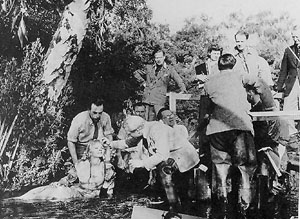
Thomas Nashe wrote in 1589 in his introduction to a book by Robert Greene, "English Seneca read by candlelight yields many good sentences -- as 'Blood is a beggar' and so forth; and if you entreat him fair on a frosty morning he will offer you whole Hamlets, I should say handfuls, of tragical speeches!" Nashe is mostly spoofing Thomas Kyd, who wrote blood-and-thunder revenge plays. So Kyd is probably the author of the first "Hamlet" play.
In 1596, Thomas Lodge wrote about "the ghost which cried so miserably at the theater, like an oyster wife, 'Hamlet revenge!'".
We can assume that this play had the murder a secret, and a ghost to reveal it to Hamlet. Some people will tell you that this play must be the source of these plot elements, which fit with the genre:
You can decide for yourself; we're not going to know whether these were introduced by Kyd (or whoever wrote the first "Hamlet" play) or by Shakespeare.
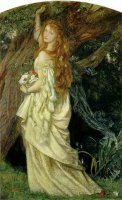 The First Quarto of Shakespeare's "Hamlet"
(Dated 1603, pirated, the "bad quarto")
seems to have been put together from an actor's memory.
(Maybe Marcellus -- his lines are best-preserved).
The First Quarto of Shakespeare's "Hamlet"
(Dated 1603, pirated, the "bad quarto")
seems to have been put together from an actor's memory.
(Maybe Marcellus -- his lines are best-preserved).
Here is Hamlet's most famous speech as it appears in the Bad Quarto...
To be, or not to be, aye, there's the point,
To die, to sleep, is that all? Aye, all.
No, to sleep, to dream, aye merry, there it goes,
For in that dream of death, when we awake,
And borne before an everlasting Judge,
From whence no passenger ever returned,
The undiscovered country, at those sight
The happy smile, and the accursed damned.
But for this, the joyful hope of this,
Who'd bear the scorns and flattery of the world,
Scorned by the right rich, the rich cursed of the poor?
The widow being oppressed, the orphan wronged,
The taste of hunger, or a tyrant's reign,
And thousand more calamities besides,
To grunt and sweat under this weary life,
When that he may his full quietus make,
With a bare bodkin? Who would this endure,
But for a hope fo something after death?
Which puzzles the brain, and doth confound the sense,
Which makes us rather bear those evils we have,
Than fly to others that we know not of.
Aye that, oh this conscience makes cowards of us all.
First
Quarto (1603) -- visit here to see just how bad the
"bad quarto" is. Warning: This link crashed my IE browser twice.
Second
Quarto (1604) -- for comparison.
Folio
(1623) -- for comparison.
"Antonio's Revenge" by John Marston, is mentioned by a contemporary source as 1601, and has a very similar plot to Shakespeare's "Hamlet".
Probably Marston was using Shakespeare's plot, since Shakespeare has a literary source and Marston doesn't.
"Der Bestrafte Brudermord" ("Fratricide Punished") is a German play that is obviously an adaptation of Shakespeare's "Hamlet", which it resembles in contradistinction to Belleforest.
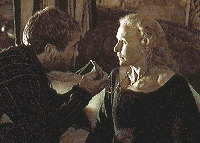
What's more, the scenes and narrative proceed in the same order as in Shakespeare's play. Somebody will tell you that the old man's name being "Corambus" is proof that "Der Bestrafte Brudermord" must therefore derive from the older Hamlet play. This seems silly to me. I'd conclude, rather, that in the first run of Shakespeare's "Hamlet", Polonius and Reynaldo were named Corambis and Montano, and that Shakespeare changed their names for some reason.
"Der Bestrafte Brudermord" has some other points of agreement with Q1 against Q2, but even more with Q2 against Q1. So both seem to be adaptations of Shakespeare's original.
Shakespeare adds more. The play is very long, and must have been trimmed for production. So Shakespeare must have written much of it to please himself.
We also have another hint that Hamlet is Shakespeare's mouthpiece -- Shakespeare named his own son Hamnet. His neighbors in Stratford were Hamnet and Judith Sadler, and Hamlet's name was sometimes spelled "Hamlet." Hamnet Shakespeare died in August 1596.
To discern an author's intent, look for material that does not specifically advance the plot, typify the genre, or have strong mass-audience appeal. Here is what Shakespeare added...
 The girl who is used as a spy on Hamlet is one about
whom he cares very much, and who may be pregnant by him.
The girl who is used as a spy on Hamlet is one about
whom he cares very much, and who may be pregnant by him.Almost all readers and viewers come away from "Hamlet" liking the prince very much. He is a thinker, and he is funny. We see into his own mind, and discover him to be genuine and sincere. We admire him for resisting the evil around him.
But Hamlet is both stupid and mean when he kills Polonius. And it is hard to like his nasty, bitter outlook on life in the first half of the play. Especially, if you do not like everything about today's teenaged "Goth" culture (wearing black, being clever and disrespectful, playing with people's feelings, complaining that life seems meaningless and empty), you won't like everything about the Hamlet who we meet at the beginning.
If this were an action-movie or something by one of Shakespeare's contemporaries, the prince might be entirely sympathetic, and his enemies altogether despicable. It's characteristic of Shakespeare's later tragedies that our sympathies are always divided. Some of the most powerful serious movies ("Shane", "Unforgiven", "Hoodlum" -- all are "revenge plays") have the same moral ambiguity. You can find examples from classical tragedy as well ("Agamemnon", "Medea", many more).
In "Hamlet", Shakespeare explains why he writes in this way -- he intends to "hold a mirror up to nature", to show us ourselves.
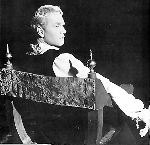
I'd already noticed when I was formally taught it in my medical school psychiatry course. For most twenty-year-olds, the biggest life-issue is, "What has happened to most forty-year-olds that caused them to lose the ideals and the authenticity of youth?" For most forty-year-olds, the biggest life-issue is, "How did I lose the ideals and authenticity that made me who I was when I was twenty?"
It's no coincidence that college Greeks profess high ideals. It's what makes them work... for people not yet corrupted by the world.
Teenaged Holden Caulfield ("Catcher in the Rye") described the shams of the "phony" society of the wealthy, and heard Hamlet had talked about the same theme. He plans to read the play eventually. In the 1970's, it was usual for people to call each other "phony" if they thought differently about something, and there was no defending against it.
Mark Twain's "Huckleberry Finn" uses another young person to comment on the falsity of adult society. Huck lives fairly well, as Hamlet does. Huck speaks only by his actions, without Hamlet's eloquence. Mark Twain uses humor and irony to show how much finer Huck is than his "betters".
|
As you enjoy the play,
watch for the theme of ceremony, and the theme of play-acting.
|
 |
In Macbeth, we are treated to a spectacle from the same era of warlords that gives the setting for "Hamlet". Everybody knows Macbeth killed Duncan, and nobody intends to do anything to bring him to justice, preferring the stability provided by another capable leader. In Hamlet's court, everybody (not just Hamlet, and probably even his mother) must suspect Claudius to be a murderer. After the play-within-the-play, it's obvious.
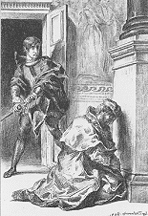 At the end, Hamlet's fideism, a vague faith in God's ability to
sort out the mess of this world without any more
specific religious dogma, is the kind of faith that
many honest, thinking people have reached in our own day. Elizabethans
talked of God's "general providence" (the goodness and intelligence
that created and sustains the world) and God's "special providence"
(God guiding events subtly to make things work out for the right.)
You will need to decide for yourself whether "special providence"
is at work in our own world, or whether Shakespeare actually
believed so. But Hamlet thinks it does.
At the end, Hamlet's fideism, a vague faith in God's ability to
sort out the mess of this world without any more
specific religious dogma, is the kind of faith that
many honest, thinking people have reached in our own day. Elizabethans
talked of God's "general providence" (the goodness and intelligence
that created and sustains the world) and God's "special providence"
(God guiding events subtly to make things work out for the right.)
You will need to decide for yourself whether "special providence"
is at work in our own world, or whether Shakespeare actually
believed so. But Hamlet thinks it does.
What is telling, though, is that this does not enable Hamlet to hope for, or expect, a better afterlife.
In the "noir" genre of hard-boiled detective fiction, the hero gradually learns about both public and private corruption. Nothing is as it seems. The hero strikes back, but the ending is never completely happy.
Hamlet is called to his revenge "by heaven and hell", i.e., something that Shakespeare thought of as more fundamental than "the struggle between good and evil". Hamlet talks a great deal about the nature of human beings, characterizes himself as "indifferent[ly] honest" and "could accuse" himself of things for which it would have been better if he hadn't been born. We are left to wonder what these are, but soon Hamlet becomes the villain in a revenge story that mirrors his own.
Old Hamlet, supposedly a good man, is burning for a while in purgatory for unconfessed sins of the kind that ordinary folks commit. Claudius, who Hamlet considers a very bad man, shows us his true mind twice, and we see a struggle between his hunger for divine grace and his need to keep his wife's love.
The morality plays that preceded Shakespeare showed examples of good and bad people, and heroes that had a clear choice and made it. Shakespeare seems to be telling us in "Hamlet" that we can and should try to live well, but that both good and bad are inherent in the human condition. Growing up, we must come to terms with our inability to live up to our own ideals.
Today we hear a lot about the usual five stages of coming to terms with death (impact, anger, bargaining, depression, acceptance.) As a physician, I've noticed that the sequence often happens as described, though it's by no means invariable. (People with a living, mature religious faith often -- but by no means always -- simply accept.)
At the end, Hamlet is no longer depressed, but accepts the human condition. Whether he's right to do so is something you'll need to decide. But it's a common experience for people growing up. And Shakespeare's shown it to us in "Hamlet".
 |
Elsewhere (for example, in "Romeo and Juliet" and "The Tempest"),
Shakespeare shows us the world being redeemed by love.
Even in
King Lear (where he seems to be saying,
as explicitly as he can, that the comforts of religion are
make-believe), Shakespeare still shows us the power of love to
make life good -- at least temporarily. Love and reconciliation
are less likely to be showcased in a revenge play.
|
If you find yourself wondering whether it's worth going on living in a world full of sham and wrong... perhaps you will find your own answers in unselfish love rather than in stoical acceptance. And perhaps you, too, can be a hero.
 Shakespeare
was constrained by his plot...
Shakespeare
was constrained by his plot...
The principal scene in which Hamlet pretends to be crazy ("puts [his] antic disposition on") is the one in which he teases Polonius, calling him a fishmonger (compare "fleshmoner", or pimp... remember that Polonius wants money for his virgin daughter.)
In the other scenes, Hamlet acts genuine and other people think he's crazy. Ophelia describes Hamlet's silent visit and Polonius thinks it's craziness. Ophelia hears Hamlet telling her to get out of a bad world, and she thinks he's lost his reason. Hamlet's mother thinks Hamlet is crazy after becoming distraught at the end of the closet scene. After the play-within-the-play, the king knows Hamlet isn't crazy, but tells the rest of the court that he must be sent away to England because of his mental illness. Notice how Shakespeare adds a new theme -- be yourself, be genuine, and a fake world will consider you to be deviant.
Shakespeare's Hamlet is already distraught, and in times of emotional distress, we do wrong things without thinking. Afterwards, Hamlet (who is "indifferent honest"), blames his "madness" for the killing of Polonius. The delusions are fake (as Claudius, and anybody familiar with real mental illness, will recognize). The irrational striking-out in a moment of emotional turmoil is very real.
Shakespeare's play focused on the mind of a man who's profoundly distraught and who is asking himself whether life is worth living. Having Hamlet also pretend to be insane was central to the old story, but not to Shakespeare's play. Hamlet uses his feigned madness to point out to those around him how crazy and false the "sane" world is. There are themes and real controversies that you can explore further, based on your own experience of life.
T.S. Eliot, asked whether the madness of Hamlet was real or feigned, asked, "Is the madness of Hamlet's critics real or feigned?" This sums it up for me.

The nonsense about Hamlet being "unable to make up his mind"
begins with his own speeches after hearing the Player King's
speech on Hecuba (he berates himself for hesitating),
and especially after talking to Fortinbras's soldier
("thinking too precisely on the event" -- i.e., people who
obsess a lot are the ones who do the least). Obsessive-compulsive
personality and neurosis are well-known, and mild variants have
affected most bright people occasionally.
Bradley points out that
Hamlet seems depressed ("melancholy") and that this will slow a person
down; early 20th century writers influenced by psychoanalysis
talked about a mother-fixation causing the depression.
But the truth is that Hamlet has no opportunity to kill the king and then justify his action, until the final disaster, when Laertes reveals "The king's to blame". In the case, "providence" provides the opportunity. Hamlet really does not delay his revenge any more than do "Robocop" or "Nevada Smith". Heroes of earlier revenge plays soliloquize about having to delay, and criticize themselves for it. But revenge plays require that the revenge take time and planning -- or there would be no play.
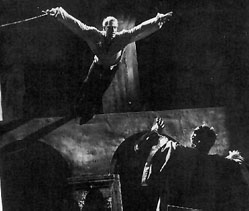 Sam Coleridge
(an obsessive who blamed the failure of his grandiose projects on
his opium habit) talked about Hamlet thinking too hard. Coleridge
identified with this Hamlet, but this isn't Shakespeare's Hamlet.
Schlegel called Hamlet "thought-sick". Goethe found Hamlet "lovely",
"sensitive" and "without strength of nerve".
Sam Coleridge
(an obsessive who blamed the failure of his grandiose projects on
his opium habit) talked about Hamlet thinking too hard. Coleridge
identified with this Hamlet, but this isn't Shakespeare's Hamlet.
Schlegel called Hamlet "thought-sick". Goethe found Hamlet "lovely",
"sensitive" and "without strength of nerve".
Now, when Hamlet expresses regrets that he's not completed his revenge, he compares himself unfavorably to the Player King (who has just recited a ridiculous, bombastic speech) and to Fortinbras (who is getting thousands of people killed for no good reason at all -- I first became interested in Shakespeare during the Vietnam war). It is no coincidence that both the Player King and Fortinbras are pursuing stupid, vain goals.
What is Shakespeare trying to tell us?
Hamlet's "revenge" isn't so much simply the killing of the king, as it is the purging of all the rottenness in the Danish court. And although it costs him his life, he succeeds.
At some time, we all consider how much wrong there is in the world. "Hamlet" gives us a chance to watch an ordinary person consciously choose to say "No!" to the world's wrongness and phoniness, and to strike back with intelligence and power. From the bare-bones of an old revenge story, Shakespeare has held up the mirror to something in us that is precious.
I hear Hamlet saying, "So many people put so much effort into doing things that are not worthwhile. It's a bad world, and I am far from a perfect human being. And we all end up dead in the end. But I am going to do something worthwhile, and do it right."
Think about it.
More on whether Hamlet has a "tragic flaw." I believe that the whole "there has to be a tragic flaw" business was dreamed up by Aristotle, who got paid to tell young people that if they were really good, then bad things couldn't happen to them, and that people went to sad shows just to have a good cry ("purge the emotions of pity and fear"). If it is helpful, point out the obvious. Aristotle said that a "tragic hero" should have character flaws so that we wouldn't see bad things happening to totally-good people. Maybe the heroes of Shakespeare's tragedies are not all-virtuous because Shakespeare wants to show us life as it really is.
Since Sophocles's ultra-coldblooded "Electra", revenge plays have been among the favorite genre for theater and movies. Why?
First, a revenge play presumes that to right a wrong, somebody is forced to take the law into his or her own hands. This showcases one of the most important and serious of human concerns -- how do we maintain good law (i.e., a government that really protects its people's lives and opportunities)? It's the central question of civilization. (The conclusion of "Electra" is chilling -- read Sophocles's answer.)
Second, the revenger must overcome obstacles to revenge. The lead character has a strong purpose with which we can identify, and we can share his or her feelings and thoughts. There is a satisfaction when revenge is finally won.
One may find ideas similar to those in "Hamlet" in Montaigne's essays (here's a top-flight college paper for an eager student), in "Ecclesiastes" (Old Testament, of course) and in the following famous twentieth-century piece (sometimes stated to be much older).
"The Desiderata" Go placidly amid the noise and haste, and remember what peace there may be in silence.
As far as possible, without surrender, be on good terms with all persons. Speak your truth quietly and clearly; and listen to others, even to the dull and ignorant; they too have their story. Avoid loud and aggressive persons; they are vexations to the spirit.
If you compare yourself with others, you may become vain or bitter, for always there will be greater and lesser persons than yourself.
Enjoy your achievements as well as your plans. Keep interested in your own career, however humble, it's a real possession in the changing fortunes of time.
Exercise caution in your business affairs, for the world is full of trickery. But let this not blind you to what virtue there is; many persons strive for high ideals, and everywhere life is full of heroism.
Be yourself. Especially do not feign affection. Neither be cynical about love; for in the face of all aridity and disenchantment, it is as perennial as the grass.
Take kindly the counsel of the years, gracefully surrendering the things of youth.
Nurture strength of spirit to shield you in sudden misfortune. But do not distress yourself with dark imaginings. Many fears are born of fatigue and loneliness.
Beyond a wholesome discipline, be gentle with yourself. You are a child of the universe no less than the trees and the stars; you have a right to be here. And whether or not it is clear to you, no doubt the universe is unfolding as it should.
Therefore be at peace with God, whatever you conceive him to be. And whatever your labors and aspirations, in the noisy confusion of life, keep peace in your soul.
With all its sham, drudgery and broken dreams, it is still a beautiful world. Be cheerful. Strive to be happy.
--Max Ehrmann, 1927
Contrast this with Polonius's advice to Laertes.
 Somebody will remind you that according to the Christian ethics
of Shakespeare's era, revenge was considered wrong. A saint would
forgive and bring about reconciliation. (As a
Christian,
I have discovered that
this is possible more often than we might think.)
Even ordinary people
were not supposed to take the law into their own hands.
It's hard, though, to see this as a major theme of this
revenge play.
Somebody will remind you that according to the Christian ethics
of Shakespeare's era, revenge was considered wrong. A saint would
forgive and bring about reconciliation. (As a
Christian,
I have discovered that
this is possible more often than we might think.)
Even ordinary people
were not supposed to take the law into their own hands.
It's hard, though, to see this as a major theme of this
revenge play.
Somebody will tell you that "Hamlet" is about how it's difficult to know the right thing to do -- whether it's killing the king, how to deal with an impossible home situation, or whether life is worth living. Somebody else will tell you that the real tragedy is that Hamlet kills the king, rather than forgiving him and living in love and harmony.
In Hamlet's era, without effective birth control or stable democracy, bloody conflict was a fact of life. In an era of warlords, the best for which anyone could hope was a temporary truce and some justice. Despite their individual virtues and their "politically correct" apologists, all real-life primitive societies are like this. Hamlet was fundamentally correct -- the world, by its very nature, is full of unpleasantness and wrong.
How does Hamlet's attitude toward women change during the play? Is this a major theme? (I think so -- it's not mentioned that often. You decide.) Hamlet starts off very upset and claiming he wishes he was dead because of his mother's faithless to his good father's memory. He urges Ophelia to withdraw from a rotten world full of rotten women. Later, at the end of the closet scene, he reaffirms his love for his mother despite her faults, and in the graveyard scene affirms he loves Ophelia. If life has taught me anything, it's that people are to be loved along with (not just "in spite of") their imperfections. Perhaps you believe this as well.
Eric Jones MD came up with an idea in "Hamlet and Oedipus". Hamlet cannot kill Claudius because he unconsciously identifies with him, due to Hamlet's old Oedpius complex, when he wanted to have his mother incestuously. Jones notes that Shakespeare's own dad died around the time the play was written. Nowadays, almost all psychiatrists will tell you that Freud's psychoanalysis is of historical interest, having shown very limited ability to predict the thoughts and actions of patients or to effect recovery. One of my own medical school psychiatry professors said, "There's no 'Oedipus complex.'" You can decide for yourself about Jones's claims.
 Is Ophelia pregnant with Hamlet's baby? Hamlet was romantically
interested in Ophelia, and she in him, and they lived in
the same castle. Hamlet jokes
with Polonius about how his daughter might become
pregnant, a pregnant rich girl might be sent for secrecy's
sake to a convent ("nunnery") and the child given for adoption,
and Ophelia sings about
lost virginity. We aren't going to know.
Is Ophelia pregnant with Hamlet's baby? Hamlet was romantically
interested in Ophelia, and she in him, and they lived in
the same castle. Hamlet jokes
with Polonius about how his daughter might become
pregnant, a pregnant rich girl might be sent for secrecy's
sake to a convent ("nunnery") and the child given for adoption,
and Ophelia sings about
lost virginity. We aren't going to know.
Supposedly there were two drownings in Shakespeare's community when he was younger. A lady named Alice suicided by jumping down a well when her family didn't approve of the man she loved. Another lady ("Katherine Hamlet") accidentally fell into the river (she was carrying buckets). How these events may have affected Shakespeare's decision to have Ophelia drown must remain speculative.
You've already noticed that Shakespeare follows a rule from his era -- the highest-ranking person on stage gets the first and last lines in each scene.
 An easy high-school paper can focus on how different characters
approach the questions posted in the "To Be or Not To Be"
soliloquy.
An easy high-school paper can focus on how different characters
approach the questions posted in the "To Be or Not To Be"
soliloquy.
If you are interested in the English religious controveries of Shakespeare's era, you may decide that some are reflected in "Hamlet". People who held to the Roman tradition might believe in Purgatory, a place of suffering where sins committed in life were burned away, and where sufferings could be eased by purchasing the ministry of the church. Before the Reformation, this had helped make the relgious orders wealthy, and also sparked the founding of schools and hospitals where the beneficiaries were asked to pray for the sould of their benefactors. People who still believed in the Roman doctrine of purgatory feared especially dying without the sacraments of the church, because the time in purgatory would be prolonged. The English government church forbidden even praying for the dead. Probably many people didn't like this. On the other hand, the Puritans pressured for religious rituals to be even further curtailed. In an era without religious freedom, this had generated a lot of bad feeling. Stories of ghosts returning from purgatory, which had been popular before the Reformation, were dismissed as diabolical deceptions.
For purposes of the plot, there is really no reason for Old Hamlet to talk about his being in torment or having died "with all his imperfections on his head" (i.e., unconfessed sins). Hamlet swears by Saint Patrick, who is sometimes described as the patron saint of Purgatory. Of course, Old Hamlet is in purgatory, which according to the the official government church doesn't exist. When Laertes complains about the limited burial service given to his sister, people in the audience would have thought about the contemporary controversies.
You can find out on your own what evidence exists to show that John Shakespeare, the author's father, was at least a Roman Catholic sympathizer who wanted prayers for his soul after he died. (Ask about documents found in Stratford centuries later.) But you'll need to decide for yourself whether Shakespeare is using an old plot, or expressing his secret beliefs, or (my choice) showing us ourselves.
Background
shakespeare.about.com --
lots of good contemporary essays.
Teachers: Click here
to begin your search for online essays intended for would-be plagiarists.
"Dishonesty was your tragic flaw, kid!" Good luck.
turnitin.com -- anti-plagiary software
The Undiscovered Country --
Hamlet site, promoting the author's e-book. Looks good.
Videos:
More: 101 reasons to
see Branagh's Hamlet
The popular movie "Coraline" quotes Hamlet's speech, "What a piece of work..." when the heroine,
who is neglected by her parents, is tempted with false promises of a richer and more
meaningful life.
The theme of the book and movie, which surely explains their popularity, is that
if parents don't attend to their children's needs to grow emotionally and mentally,
someone else will. And it will probably be the wrong people.
Robert H. Rempe, Ph.D. on Stoppard and Hamlet.
You may find it more rewarding to focus on something at once
more obvious and more profound.
Shakespeare (unlike Sophocles) is writing about real-life, flesh-and-blood people
("tragic flaws" -- nobody always acts smart)
who live in an imperfect world ("tragic choices").
In Shakespeare, our sympathies are usually divided among the characters.
For this reason, Aristotle's thoughts on tragedy (i.e., people
are imperfect)
really seem more useful in discussing Shakespeare than in
discussing Sophocles.
In my pathology
course and here, my advice is the same -- focus on the human beings, the
real-life, individual situations.
Prometheus Bound You may also decide there are some common theme
elements (real vs. fake friendship; bad government is bad for
the country; despite what has happened to you, you can still be a hero).
If you decide that the philosophical Hakuna
Matata ("Everything is fine") song is ironic,
then the central
theme of "The Lion King" is that life is by its nature
full of troubles and wrongs, and you find its meaning in what you do about it this fact.
Of course, "compare and contrast" papers are for beginners.
(1) Look at the short story that provided
the plot
(click here.
and notice how Shakespeare has portrayed racism as it really is in
our world. Ordinary decent folks (i.e., the Venetian government) care only
who a person is and what that person can do. They consider Brabantio
a jerk for accepting a person of another race as a friend but not as a son-in-law.
Iago, who for whatever reason
has a chip on his shoulder, spews racial venom for his own dark reasons.
Desdemona is originally frightened by someone who looks different, but
quickly learns to love that person so that race become indifferent.
(2) It is very common for special-forces operatives who return to
civilian life and/or who try to sustain a marriage to have terrible
difficulties. Those who are
successful deserve our special admiration. Too many become
terribly confused and end up in self-destructive behaviors,
both loving and hating. It's one of our world's
strangest ironies that romantic love is more treacherous and incomprehensible
than war.
You can E-mail me
at efriedlander@wmcarey.edu.
Brown University,
Department of English -- my home base, 1969-1973.
Anagram of:
Teens:
Stay away from drugs, work yourself extremely hard in class or
at your trade, play sports if and only if you like it,
and get out of abusive relationships by any means.
Tell the grownups who support you that you love them (no matter
what the circumstances or what feelings you really harbor -- get guidance
from other adults if you need it, and remember Polonius's advice, which
works often enough in our crazy world).
The best thing anybody can say about you is, "That kid likes to
work too hard and isn't taking it easy like other young people."
To include this page in a bibliography, you may use this format:
Friedlander ER (1999) Enjoying "Hamlet" by William Shakespeare Retrieved Dec. 25, 2003 from http://www.pathguy.com/hamlet.htm
For Modern Language Association sticklers, the name of the site itself
is "The Pathology Guy" and the Sponsoring Institution or Organization
is Ed Friedlander MD.
Delville
& Michel
Dan
VanVoorhis on Hamlet
Kronberg
Castle, in Helsingor ("Elsinore"), near Copenhagen, is
supposedly Hamlet's castle. Photo.

 Commentary:
Commentary:
T.S.
Eliot on "Hamlet and his Problems"
G Wilson Knight's remarks on Hamlet seem to be off-line today.
Shakespeare always divides our sympathies. Knight
sees Hamlet as more the villain than Claudius is.
Hamlet Online
Introduction
to Hamlet Postmodernist. "... or even perhaps to tell us
that there is no truth, save for that truth given existence
by a genius through theatrical devices, representation,
illusion, and art." Uh?
Hamlet for the Shakespeare-Impaired.
Modern-language and humor. Highly recommended.
No Fear -- text along with 21st-century English translation
Hamlet: A Shortened Version in Modern English -- by my cyberfriends, John and Leela Hort
Sixty-Second Shakespeare -- "Bloodbath at Danish Court -- 'Mad' Prince Hamlet Was Right All Along"
A Night in Elsinore -- parody
Trysto Hamlet -- extremely abridged, could be performed by small children
Oor Hamlet --
mock Scots ballad, very funny.
here,
here,
or here.
McGoodwin Summary
Shakespeare's Sonnets.
A remarkable sequence even by today's standards. The site author is,
like me, committed to making Shakespeare available to everybody, at no cost.
Enjoy.
Duane Morin -- an e-book is in preparation
Absolute Shakespeare. Good introductions!
.
Plagtracker.com -- a new, free plagiary-catcher service To the best of my knowledge, all the links
on my literature pages are to free sites. In August 2000, the operator of
the large for-profit help-with-homework online Shakespeare site offered to
buy these pages out "for a price in the low four figures." I refused,
and the site owner replied that "I wish you would just close down the
domain and spare everybody from a lot of wasted time. It's a shame."
This site will always remain free, to help everybody enjoy the
works that I have, myself, enjoyed so much. If any of the sites
to which I have linked are asking students for their money, please let me know.
To the best of my knowledge, all the links
on my literature pages are to free sites. In August 2000, the operator of
the large for-profit help-with-homework online Shakespeare site offered to
buy these pages out "for a price in the low four figures." I refused,
and the site owner replied that "I wish you would just close down the
domain and spare everybody from a lot of wasted time. It's a shame."
This site will always remain free, to help everybody enjoy the
works that I have, myself, enjoyed so much. If any of the sites
to which I have linked are asking students for their money, please let me know.

I've occasionally gotten E-mails from puzzled
students whose instructors have told them that Hamlet is a villain.
Upon inquiry, it's turned out that the instructor is a political extremist.
(There are evidently people who hate Hamlet for expressing his doubts about conventional
religion. There are evidently others who
hate Hamlet and Shakespeare because they are the wrong race and gender
and are not preoccupied with
grievance-group
special-interest politics.)
If you run into this, handle it any way you want, remembering
that the large majority of your classmates do not agree with the instructor.
G. Wilson Knight once made an issue of the fact that in the prayer scene,
Claudius is interested in forgiveness and Hamlet isn't,
and that Claudius is right to have Hamlet killed because Hamlet
is unstable and dangerous. Decide for yourself, remembering
that in Shakespeare's works, our sympathies are always divided, and that
this scene may have been a plot element from the older play.
Another commentator makes political capital
by voicing the same complaints about The Lion King
("Hamlet on the Savannah").
Accepting authority is bad, and fighting back is bad.
There's no reasoning with people like this.
BBC Animated Version part 1 -- good introduction
BBC Animated Version part 2
BBC Animated Version part 3
Great PerformancesDavid Tennant / Patrick Stewart -- watch the entire NC-17 play
Branaugh -- To be or not to be
Laurence Olivier -- frailty soliloque
Laurence Olivier -- introduction for children, well done
David Tennant -- coward scene
David Tennant -- To be or not to be
David Tennant -- last scene
Spark Notes -- "quick and easy"
Royal Shakespeare Company -- David Tennant / Patrick Stewart; watch the play; highly recommended
Schwarzenegger -- parody
Richard Burton -- To be or not to be
Richard Burton -- Hamlet and the Ghost
Ethan Hawke -- To be or not to be
Derek Jacobi -- To be or not to be
Star Wars -- Hamlet and Laertes trade weapons
Nicol Williamson -- gravedigger scene
Patrick Stewart -- "Where is my father?"
Patrick Stewart -- Ophelia mad
Hamlet -- the Music Video -- hilarious
Jude Law -- talks about his Hamlet
Reduced Shakespeare Company
Productions:
Jude Law as Hamlet.
Also here
and here.
Adrian Lester
David Tennant's Hamlet
David Tennant's Hamlet
Guthrie Theater, MN
Costa Mesa, CA --
Coventry -- Patrick Stewart as Claudius
Sam West -- Royal Shakespeare Company 2000
Public Broadcasting System --
gets NC-17 rating. Psychological thriller.
Graphic violence. Scenes of a supernatural nature.
In a time of conflict, a voice from the grave will take
a vengeful man to a place beyond sanity where only
conspiracy and death await.
Repertory Philippines
Kevin Hardesty
Costa Mesa
Ballet -- Hungary
Ballet -- Leeds
Minnesota, 2006
Keanu Reeves
Providence
Wardour Castle
Royal Shakespeare Company
Klingon Hamlet
Royal Shakespeare Company
Sixty Second Hamlet -- BBC
Hampshire

Ethan Hawke's
Hamlet is set in contemporary New York City.
I liked it much better
than most of the critics did.
Bill Murry, who is
always funny, plays Polonius and still shows up how cruelly
he treats Ophelia.
Hamlet and Ophelia in art
Green Eggs and Hamlet
Scooby Doo
solves the mystery
 Words and phrases by Shakespeare -- under development
Words and phrases by Shakespeare -- under development
 Antony & Cleopatra -- just getting started
Antony & Cleopatra -- just getting started
Julian of Norwich
King Lear
La Belle Dame Sans Merci
The Lady of Shalott
Macbeth
A Midsummer Night's Dream
Moby Dick
Oedipus the King -- including something about the "tragic hero" business
If you are asked to write about Shakespeare's "tragic heroes" or
their "tragic flaw"
or whatever, help yourself to my skeptical
notes on Aristotle.
The Book of Thel
The Knight's Tale
The Seven Against Thebes
The Tyger
Timbuctoo
Twelfth Night
It has often
been noted that The Lion King
has plot elements in common with the Hamlet story that Shakespeare
inherited.

I've received several requests for my thoughts on Othello,
and wish I had time to put something together. For now, if you're asked to
write on the play, here are two ideas.


Likewise, it'll be a while before I can put anything online about "The
Merchant of Venice." I do want to take a minute to ask people
considering Shakespeare's presentation of Shylock to consider his era.
In all but Shakespeare's earliest plays, our sympathies are always
divided.
Shakespeare's English
contemporaries would seldom or never see a real Jew (they had been expelled
from England in 1280), and
the "stage Jew" of the time was an evil, comic figure.
Nevertheless, Shakespeare is the first writer to present a Jew as a human
being. And it is easy to understand
why Shylock is bitter and angry. Even at the beginning,
the protagonists of the play talk trash
to him simply because he is a Jew, obviously without even thinking.
It's impossible not to notice this. They invite Shylock to
their party simply so that his daughter can rob him,
and afterwards they are only amused when his feelings are trampled.
The play is actually about anger --
and Shakespeare has chosen a Jew to represent somebody who is right
to be angry. This is more than a progressive choice -- it must have taken
a great deal of courage.
Defending himself, Shylock points out the evils of slavery, which
the Jews did not practice but which was accepted at the time by some
Christians. (It was illegal in Shakespeare's England but would soon
re-emerge in the colonies.)
The most famous speech ("The quality of mercy...")
anticipates what I've found to be Shakespeare's greatest theme, i.e.,
in a godless universe, our only hope is to be kind to one another.
No matter what your grievance is, why not be the first to
take the brave step to end the stupid hatreds that darken our world?
Shakespeare's "Romeo and Juliet" may have been spoiled for you as required reading in high
school, and/or by parodies of the balcony scene and/or a bad (left-wing, right-wing) college
"Western Civ" course. Think: The play's about godawful teenaged murder-suicide. (Juliet is 14,
Romeo 16.) Shakespeare's
plot-source
was a warning to teenagers to obey their parents. The
themes of the play, which were pretty-much new with Shakespeare and very radical in his time, are
(1) young people ought to be allowed to marry for love, not just whoever their parents choose for
them; (2) young people's tragedies likely result from their parents' stupidity and meanness; (3) love
matures people, and gives dignity, meaning, and beauty even in the worst of circumstances. By
the way, did you notice that Papa Capulet is an old guy ("past [his] dancing days",
thirty years since he was "in a mask"), but Mama Capulet
was pregnant with Juliet at age 13. In other words, she was the old
lecher's forced child-bride and she is setting up the same thing for Juliet.
Forced marriage is still common (and the typical cause for a young girl's suicide)
in much of our world. Did you notice that the Capulets are not terribly
surprised to find Juliet dead on her wedding day?
The fact that forced marriage is illegal in the United States and England
may be due, at least in part, to the fact that we listened
when Shakespeare showed us who we are.


 I'm Ed.
You can visit me at my own page
and
follow the links from there to my autopsy page, my
notes on disease (the
largest one-man online medical show, helping individuals
around the world), my Adventure
Gaming sites, or any of the other sites.
I'm Ed.
You can visit me at my own page
and
follow the links from there to my autopsy page, my
notes on disease (the
largest one-man online medical show, helping individuals
around the world), my Adventure
Gaming sites, or any of the other sites.
Fellow English majors -- Okay, okay, I know the commas are "supposed" to go inside the
quotation marks and parentheses. This became standard to protect fragile bits of movable type. My practice lets me know I'm the one who's
typed a particular document.
In one of the Bard's best-thought-of tragedies,
our insistent hero, Hamlet, queries on two fronts
about how life turns rotten.
"To be or not to be: that is the question;
Whether 'tis nobler in the mind to suffer
The slings and arrows of outrageous fortune..."

Hamlet considers suicide.
It is almost certainly a bad idea.
Among young people who made serious attempts and
failed, 99% said a year later that they are glad they failed.
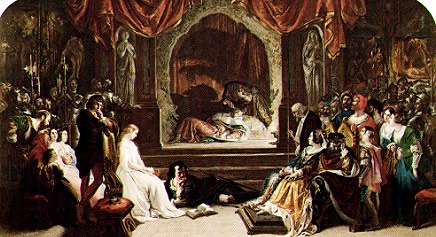
Thanks for visiting. Health and friendship.
| New visitors to www.pathguy.com reset Jan. 30, 2005: |

| If you have a Second Life account, please visit my teammates and me at the Medical Examiner's office. |
Ed's "Planescape" Site -- Adventure Gaming
Athar: "Hamlet" is post-Christian.
Bleakers: Sigh. Hamlet didn't find meaning, because
there isn't any, but he did find peace.
Ciphers: Hamlet found out he could act instead of brood.
Doomguard: The court goes bad and everybody dies.
Dust Folk: Hamlet finds peace in death.
Free League: There are many meanings here.
Godsfolk: Hamlet develops as a person.
Guvnurs: Nowadays with good
forensic pathology,
we could
have proved the case against Claudius without Hamlet
having to take the law into his own hands.
Hardheads: See what happens when law and order break down.
Mercykillers: We love a good revenge play.
Revolutionaries: Authority corrupts.
Sensates: "Hamlet" showcases powerful feelings.
Signers: There is nothing either good or bad but thinking makes it so.
Takers: Hamlet learned to quit moping and got what he wanted.
Xaositects: Crazy make sense people the most.
|
"What is there about Shakespeare that would interest a contemporary
American?" Visitors send me this question from time to time. If being a "contemporary American" means being focused on dirty TV sitcoms, greed, casual sex, big-money sports, shout-and-pout grievance-group politics, televangelism, professional wrestling, crybabies, slot machines, postmodernism, political action committees, and "war on drugs" profiteering... then the answer is probably "Nothing." If a contemporary American can still ask, "Is life worth living in a world full of wrong? And can I live well?" -- then the answer is maybe that "Shakespeare deals with basic human issues." |
 |


| Travis Morgan -- gym buddy, skydiver, long-term friend --
has a new site to help ordinary folks catch computer misbehavior. |
 |
Taser Video 83.4 MB 7:26 min |
 |
Click here to
see the author prove you can have fun skydiving without being world-class. Click here to see the author's friend, Dr. Ken Savage, do it right. |
|
Jake Walker as Hamlet Thanks for the memories and for your friendship. Give me that man That is not passionís slave, and I will wear him In my heartís core, ay, in my heart of heart. |
 |
